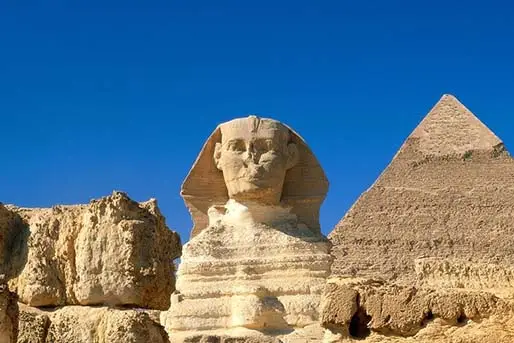
2500 BC
The Great Sphinx of Giza, literally Father of Dread, is a limestone statue of a reclining sphinx, a mythical creature. Facing directly from West to East, it is on the west bank of the Nile in Giza, Egypt. It is the oldest known monumental sculpture in Egypt. Image information: Great Sphinx of Giza.
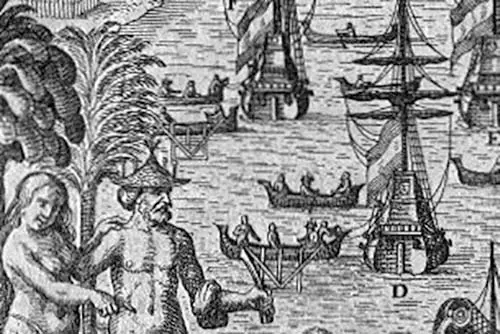
2000 - 1500 BC
The Marianas are home to one of the oldest Pacific Island cultures. The Marianas were settled by seafaring peoples from Island Southeast Asia more than 3,500 years ago. It is uncertain whether the islands were settled in waves of migration or all at once, though it is known that the Marianas were continuously occupied by people who became known as CHamorus/Chamorros. Image information: Ladrones/Mariana Islands courtesy of the Guam Public Library System.
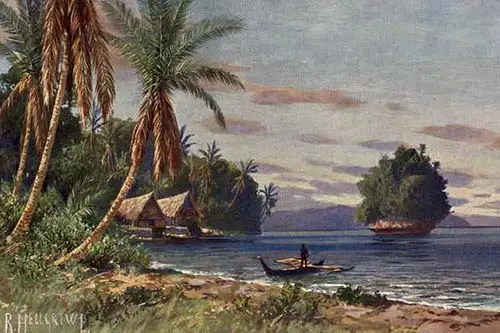
1500 BC
The Palauan archipelago was settled in a series of migrations originating from Island Southeast Asia around 1100 BC. Palau's geographic location made it an easy stepping stone into the Pacific from Asia. Image information: Village on the Palau Islands.
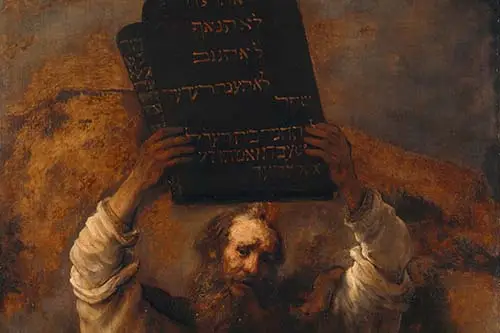
1240 BC
The Ten Commandments, also known as Aseret HaDibrot (“Ten Sayings” in Hebrew) or Decalogue, are the first ten of the 613 commandments given by God to the Jewish people. They form the foundation of Jewish ethics, as well as civil and religious law. These commandments are mentioned twice in the Torah—once in Exodus and again in Deuteronomy. Image information: Moses Smashing the Tablets of the Law.
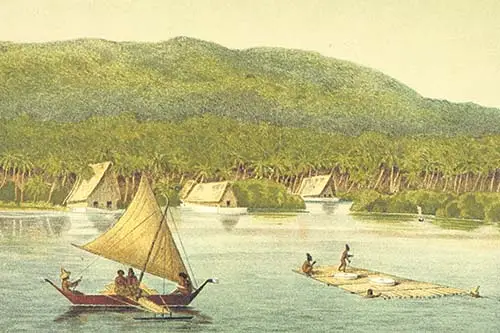
1200 - 1000 BC
The first settlers in Yap were ancient peoples from the Malay Peninsula, the Indonesian archipelago, New Guinea, and the Solomon Islands. Some of the people of Yap's neighboring islands are descendants of Polynesian settlers and as such, have significant ethnic dissimilarities from the people of the Yap main islands. Image information: Port of Yap.
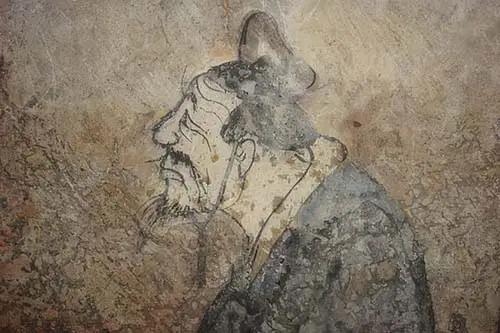
604 BC
Lao-tzu, founder of Taoism, was born in 604 BC. Lao-Tzu, also Laozi, (literally "Old Master") was a Chinese philosopher and writer. He was a scholar, the Keeper of the Archives for the royal court, and is the reputed author of the Tao Te Ching, the foundation of philosophical Taoism. A semi-legendary figure and contemporary of Confucius, Lao-tzu is a deity in religious Taoism and traditional Chinese religions. Image information: Confucius.
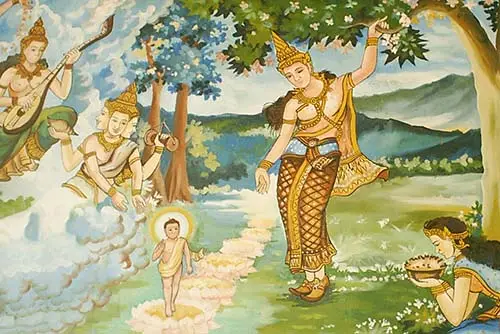
563 BC
Siddhartha Gautama, the founder of Buddhism, was born in what is modern day Nepal. Gautama is the primary figure in Buddhism. He is believed by Buddhists to be an enlightened teacher that attained full Buddhahood. Image information: Birth of Buddha at Lumbini.
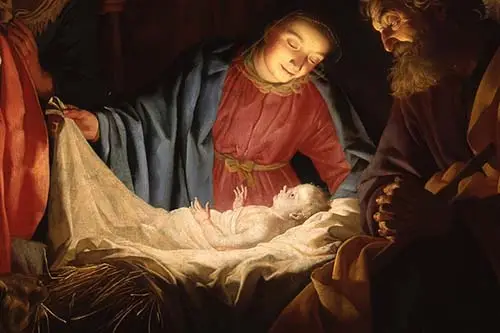
4 BC
Jesus of Nazareth, the founder of Christianity, was born around 4 BC. Jesus is a religious leader revered in Christianity, one of the world’s major religions. He is regarded by most Christians as the incarnation of God. Image information: Adoration of the Shepherds.
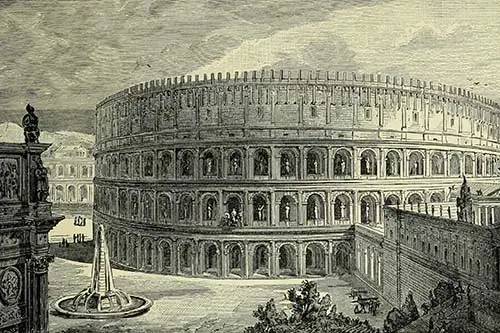
AD 372
The Colosseum, also known as the Flavian Amphitheater, opened to the public around AD 80. The massive stone amphitheater was commissioned by Emperor Vespasian of the Flavian dynasty as a gift to the Roman people. Vespasian’s son Titus opened the Colosseum with 100 days of games, including gladiatorial combats and wild animal fights. Image information: History of Rome and the Popes in the Middle Ages.
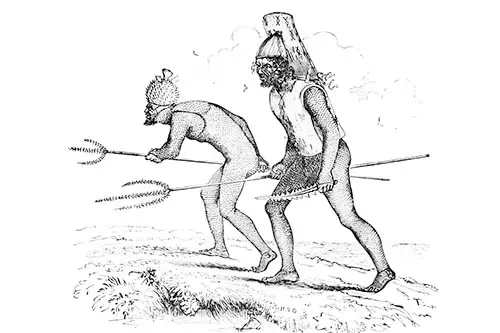
AD 500
Kiribati was first inhabited by Micronesian people about AD 500. Later, invasions by Samoans and Tongans introduced Polynesian elements into the culture and invasions by Fijians introduced Melanesian elements too. Image information: Tabiteuean Warriors of the Gilbert Islands, About 1840.
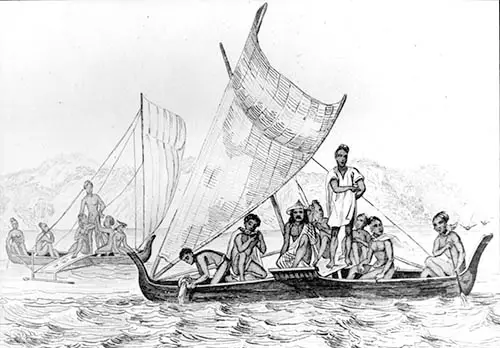
AD 500
Ancient people settle Chuuk, Pohnpei, Kosrae from Island Southeast Asia, Melanesia and West Polynesia in different waves of migration. These islands were inhabited for at least 1,000 years before they were visited by European explorers. Image information: Carolinian Navigation, 1836. Image information: Grand Archipelago of the Carolines courtesy of the Micronesian Area Research Center (MARC).
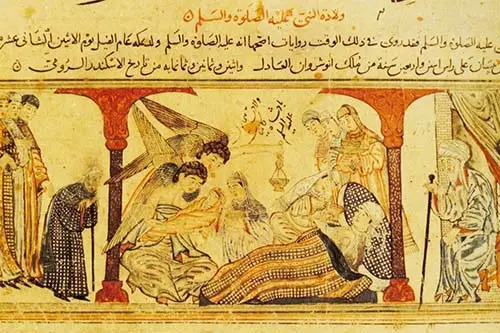
AD 570
Muhammad was born at Mecca, Arabia (now in Saudi Arabia). He is the founder of Islam and the proclaimer of the Qurʾān. According to Islamic doctrine, he was a prophet and God’s messenger, sent to present and confirm the teachings preached previously by Adam, Abraham, Moses, Jesus, and other prophets. Image information: Birth of Prophet Muhammad.
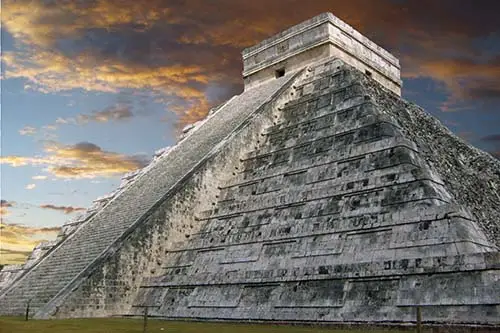
AD 750
Chichen Itza, a large pre-Columbian city, was built by the Maya people around AD 750. The archaeological site is located in Tinúm Municipality, Yucatán State, Mexico. Image information: Chichen Itza.
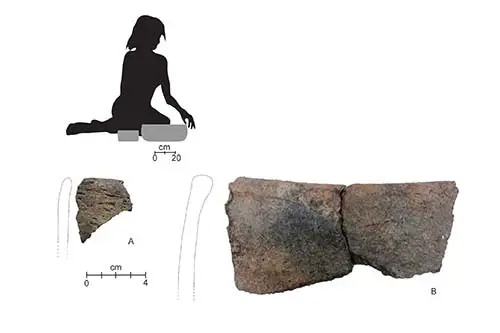
AD 1000
The oldest Marianas redware pottery was small thin walled bowls sometimes decorated with impressively fine designs. Over the years, though, pottery styles changed. Pottery became coarser, thicker and larger. By AD 1000 CHamorus/Chamorros were making large bowls with thickened rims, many with combing marks. Image information: Image of AD 500 - AD 1000 pottery courtesy of Dr. Mike Carson.
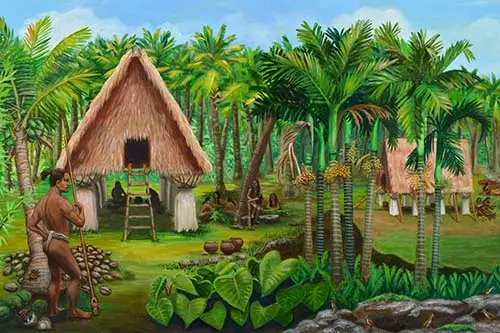
AD 1000
More than 1,500 years after the Marianas were first settled CHamorus/Chamorros developed latte, comprised of a stone pillar and a stone capstone. Latte were erected in two parallel rows of six to ten pillars and used as building foundations. Image information: Latte Village detail from the Guam Museum.
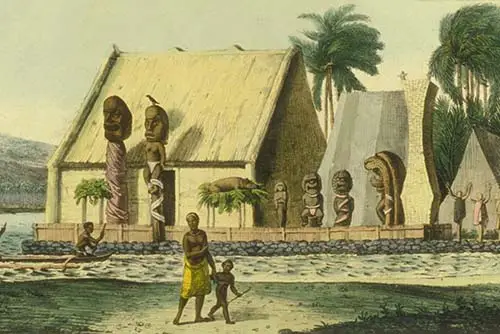
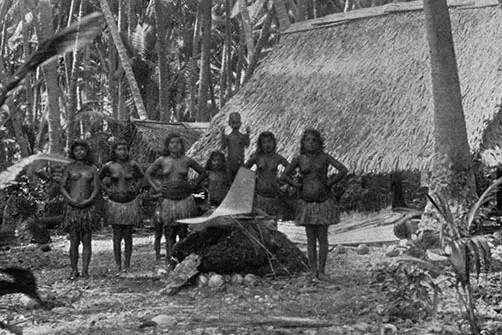
AD 1000
Nauru is settled by ancient people from both Micronesia and Polynesia. There are 12 traditional clans or tribes which are represented in the 12-pointed star in the nation’s flag. Nauruan society, like other Micronesian cultures, traces descent on the matrilineal, or female, line. Image information: Scene at Arenibek, Nauru.
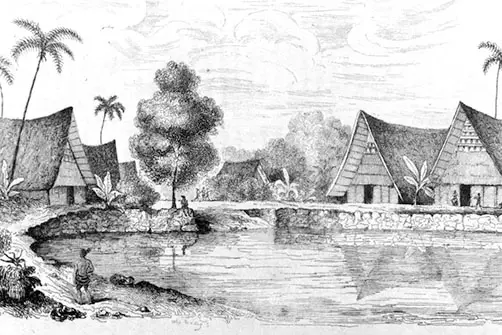
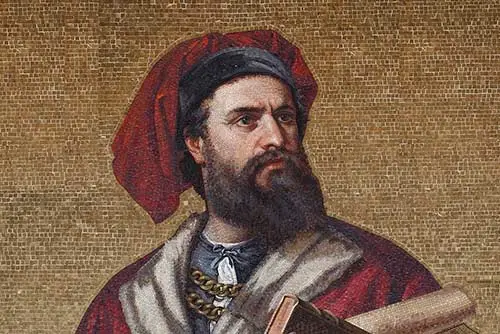
AD 1295
Marco Polo, a Venetian merchant, journeyed across Asia at the height of the Mongol Empire. Marco Polo remained abroad for 24 years. Though not the first European to explore China he became famous for his travels thanks to a popular book he co-authored while languishing in a Genoese prison. Image information: Mosaic of Marco Polo.
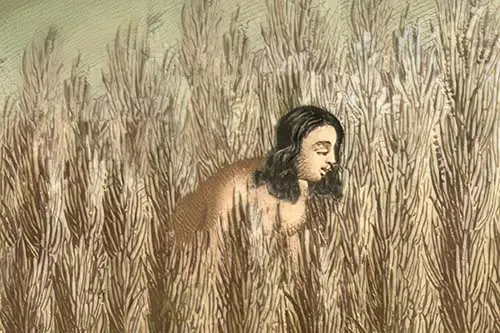
AD 1300
Early historic accounts about the Marianas say rice was produced in large quantities in pre-Spanish times. It was used as a commodity for trade between islands and later, with the Europeans to obtain metal and other goods. The CHamorus/Chamorros were the only Pacific Island people known to have cultivated rice dating back to pre-contact times. Image information: Altered Island of Guam: Agricultural Work courtesy of the Guam Public Library System.
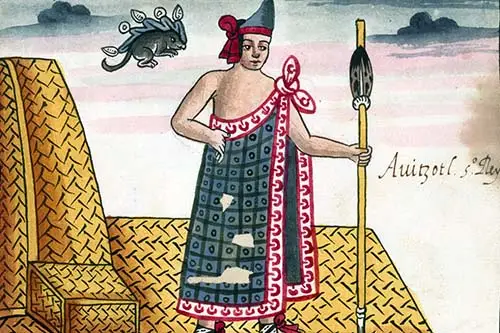
1487
The Aztec Empire, or the Triple Alliance, began as an alliance of three Nahua altepetl city-states: Mexico-Tenochtitlan, Texcoco, and Tlacopan. It reaches its peak under the rule of Ahuitzotl. Image information: Auitzotl, the Eighth Aztec King.
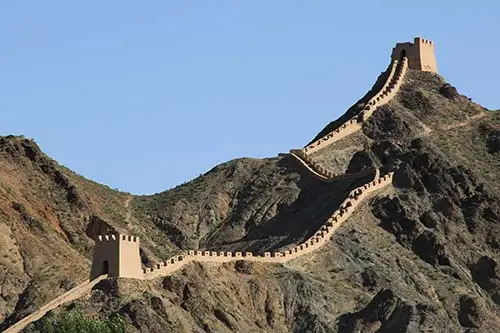
1492
The Ming emperor orders rebuilding of the Great Wall as protection against northern invaders. Building the Great Wall began when fortifications, built by various states from 771 BC on, were connected by the first emperor of China, Qin Shi Huang, to protect against incursions by nomads from Inner Asia. Image information: Great Wall of the Ming Dynasty.
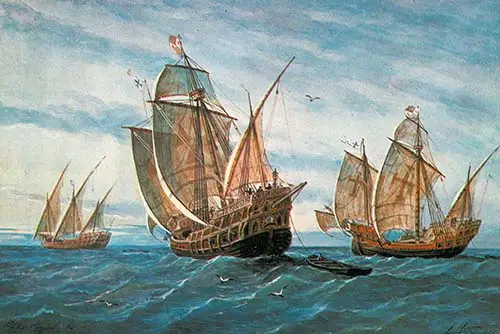
1493
Christopher Columbus, an Italian explorer and navigator, completes four voyages across the Atlantic Ocean under the auspices of the Catholic Monarchs of Spain. Columbus first left Spain in August 1492 with three ships, making landfall in the Bahamas. Image information: Columbus’ Vessels from the Micronesian Area Research Center (MARC).
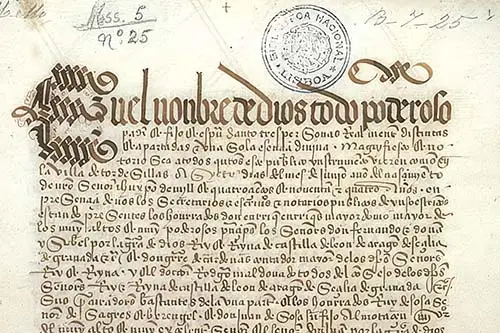
1494
The Treaty of Tordesillas is signed by Pope Alexander VI, dividing the world between Spain and Portugal. The Mariana Islands are placed on the Spanish side. Image information: Courtesy of Dr. Carlos Madrid.
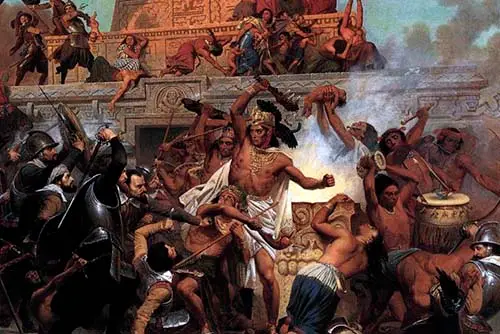
1521
The Aztec empire flourished between 1345 and 1521, dominating ancient Mesoamerica. But Hernan Cortés, with his formidable firearms and thirst for treasure, brought devastating destruction and disease, along with willing local allies. Image information: Storming of the Teocalli by Cortez and His Troops.
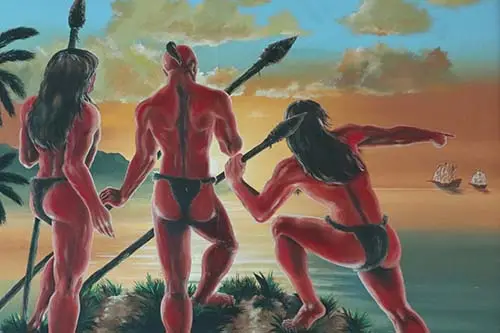
1521
The first European encounter for CHamorus/Chamorros in the Marianas was with Spain's Ferdinand Magellan and his crew aboard three ships attempting to circumnavigate the world. Image information: First Encounter courtesy of the Guam Museum.
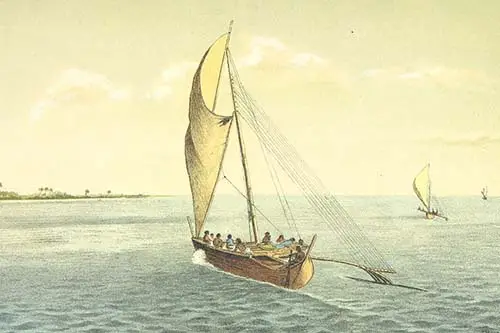
1529
Spanish explorer Álvaro de Saavedra came across the Marshall Islands on an expedition to find new lands in the Pacific and to bring back spice plants to Europe. He sailed from Mexico to the Philippines, making him the first European navigator to cross the Pacific Ocean from the Americas. Image information: Canoe, Marshall Islands.
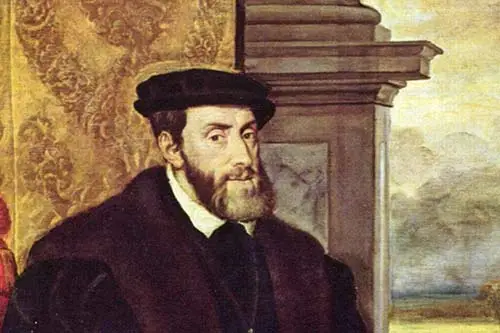
1529
This peace treaty did not modify the line of demarcation established by the Treaty of Tordesillas. However, Portugal gained control of all lands and seas west of the line, including all of Asia and its neighboring islands so far “discovered,” leaving Spain with most of the Pacific. Image information: Portrait of Charles V.
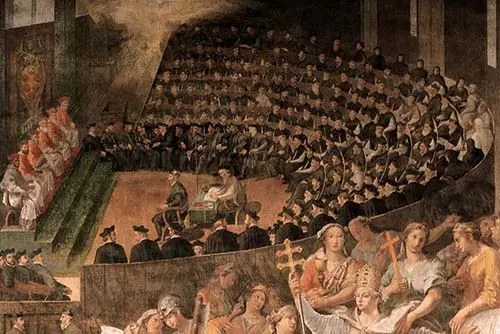
1545-1563
The Catholic Church's Council of Trent, prompted by the Protestant Reformation, issued condemnations of what it defined to be heresies committed by Protestants. The Council issued key statements and clarifications of the Church's doctrine and teachings, including scripture, sacred tradition, original sin, the sacraments, Mass and the veneration of saints. Image information: Council of Trent.
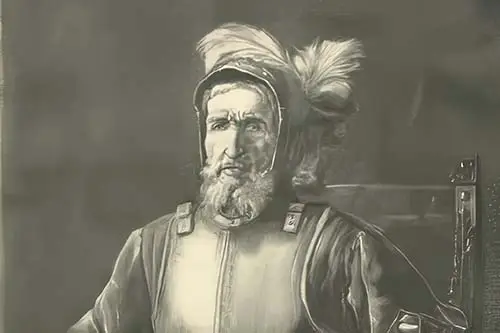
1565
Miguel López de Legazpi, a colonial official in Mexico, Pacific explorer and conquistador, led the 1565 expedition that visited Guam on its westward voyage from Mexico to Cebu in the Philippines. Legazpi claimed Guam for Spain, and was later granted possession of Guam and Rota by the Spanish King Philip II. Image information: Miguel López de Legazpi.
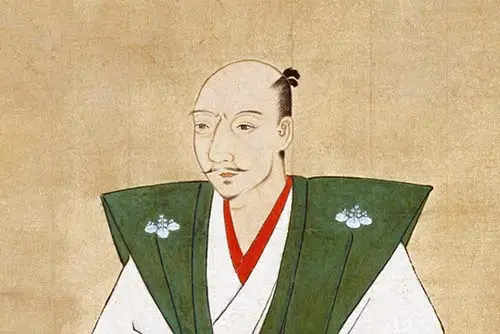
1568
Oda Nobunaga, a powerful feudal lord of Japan in the late 16th century, attempts to unify Japan during the late Sengoku period (Age of the Warring States), and gains control over most of Honshu. Nobunaga is regarded as one of three unifiers of Japan. Image information: Portrait of Oda Nobunaga.
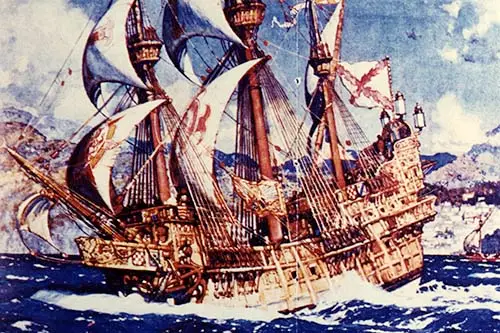
1568 - 1815
The Manila Galleon (“Nao de China” or “Nao de Acapulco”) brings porcelain, silk, ivory, spices, and myriad other exotic goods from China to Mexico via Manila in exchange for New World silver. The Galleons stopped in the Marianas on the return trip to Manila, once or twice a year. Image information: Nuestra Señora del Pilar de Zaragosa courtesy of the Guam Museum.
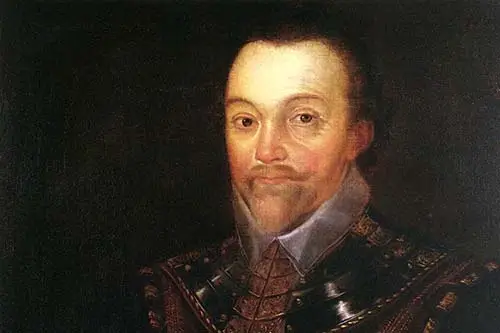
1582
Francis Drake, an English sea captain, privateer, slave trader, naval officer and explorer, was knighted for plundering Spanish ships and towns. He was the second explorer to circumnavigate the world in a single expedition, and was the first to complete the voyage as captain. Image information: Sir Francis Drake.
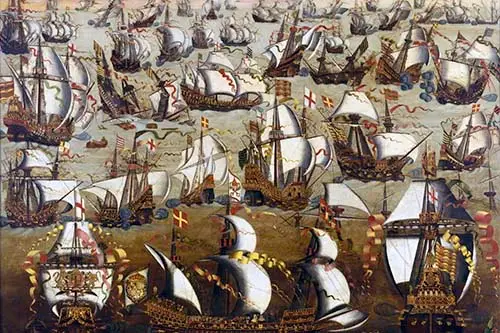
1588
The Spanish Armada, a fleet of 130 ships, tries to overthrow England and the establishment of Protestantism in 1588. The attack was Spain's attempt to stop English interference in the Spanish Netherlands and the harm caused to Spanish interests by English and Dutch privateering. The armada was defeated, however, losing one third of the ships. Image information: English Ships and the Spanish Armada, August 1588.
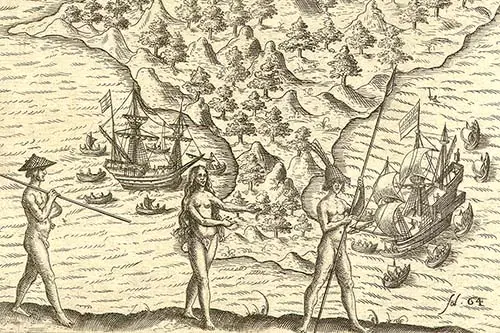
1602
Franciscan lay brother Fray Juan Pobre de Zamora deserts a ship off the shores of Rota on his way to Manila. Although he was only in the Mariana Islands for seven months, he provided an invaluable historical contribution through descriptive written accounts of the lives, customs, and culture of CHamorus/Chamorros in the early 17th century. Image information: Chamorros of the Marianas, 1602, courtesy of the Guam Public Library System.
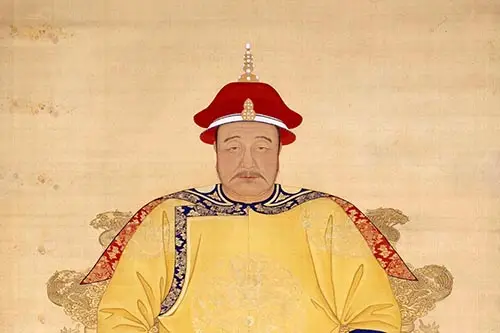
1644
The Qing dynasty is established, becoming the last imperial dynasty of China. It ruled China until 1912, when it was succeeded by the Republic of China. It lasted for almost three centuries and formed the territorial base for modern China. It was the fourth largest empire in world history. Image information: Portrait of Hong Taiji.
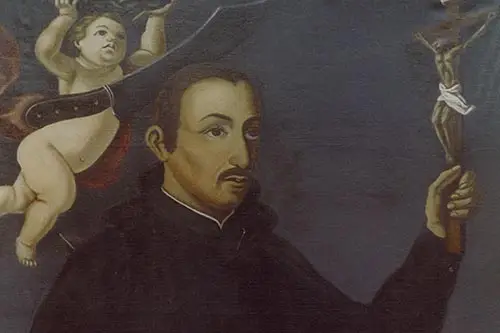
1668
Padre Diego Luis de San Vitores, a Jesuit, brought Christianity to the Marianas in 1668. He was killed on Guam just a little less than four years after his arrival, a death he welcomed because he would be considered a martyr in his efforts to spread Christianity. Image information: San Vitores courtesy of the Guam Public Library System.
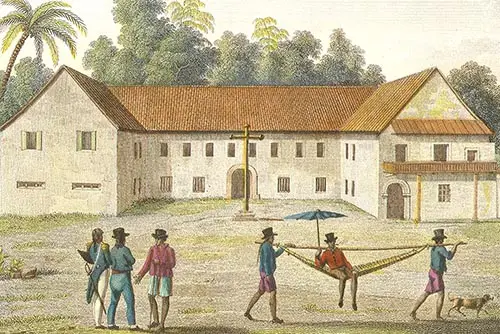
1669
The Colegio de San Juan de Letrán, a boy’s school or seminary, is established in 1669 in Hagåtña by Father Diego Luis de San Vitores, the Jesuit priest who started the first Catholic mission in the Marianas. It was still in existence in 1899 when the Americans claimed the island. Image information: Colegio de San Juan de Letran, Hagåtña, 1819, courtesy of the Guam Public Library System.
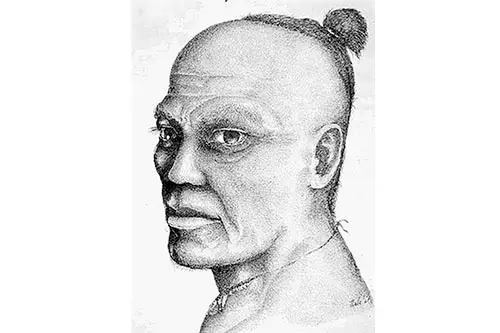
1671
Hurao, a Hagåtña CHamori (high caste) who, with the backing of the village makanas (spiritual leaders), was key in instigating a major battle. He rallied 2,000 CHamoru/Chamorro warriors to take up arms. This battle was the first mass movement by Chamorros against the Spanish. Image information: Rendering of Hurao by Jose "Malet" Garrido.
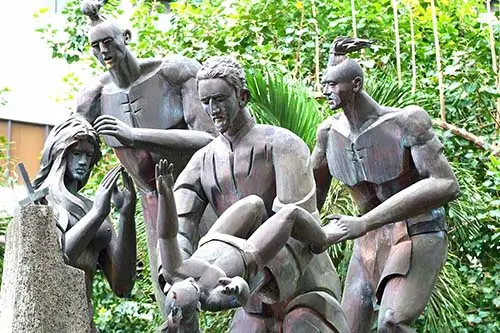
1672
Matå’pang from Tomhom (Tumon) killed Father Diego Luís de San Vitores, the Spanish priest who brought Christianity to the Marianas. At first a Christian convert, Matå’pang rejected Christianity because he saw that it was being used as a tool to control his people and obliterate CHamoru/Chamorro traditions and beliefs. Image information: San Vitores Shrine Statue, photo by Victor Consaga.
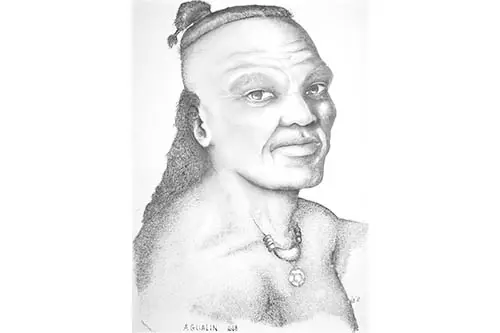
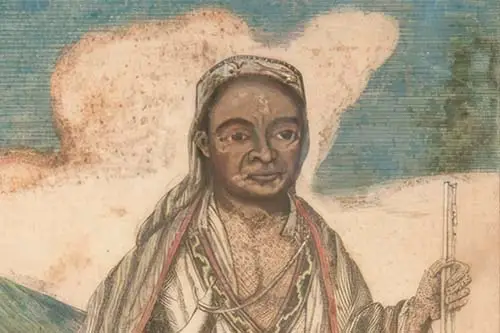
1678
Chief Metacom, of the Wampanoag people, stood up to the British colonists in America. Metacom used his tribal alliances to coordinate efforts to push European colonists out of New England. Conflicts over land use, diminished game as a consequence of expanding European settlement, and other tensions, were behind their dissatisfaction. Image information: Metacom from the World History Encyclopedia.
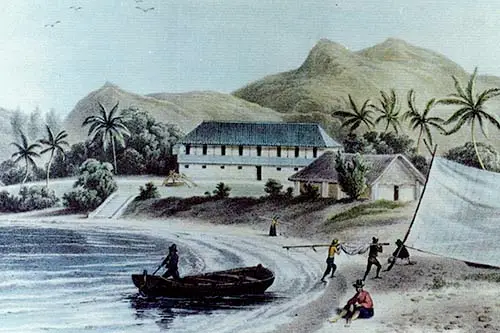
1680
Spanish Captain Antonio Saravia was appointed the first official Military Head Commander (later governor) of Guam upon the authority of King Charles II of Spain. One of Saravia’s first acts was to persuade all the CHamoru/Chamorro leaders to take and sign an oath of allegiance to Spain. Image information: Spanish Governor’s Palace, Umatac (Humåtak), courtesy of the Micronesian Area Research Center (MARC).
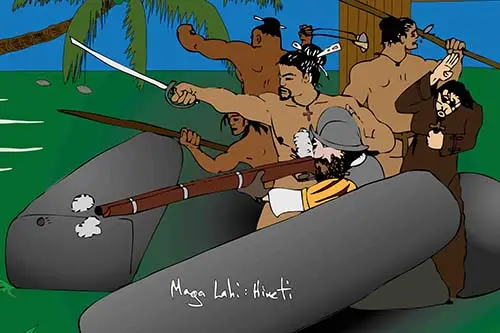
1684
Hineti, a clan leader from Sinajana, chose to protect the Spanish in hopes of improving his personal status and gain power. Hineti defended the Spanish against CHamoru/Chamorro revolts, and is most known for curbing a Chamorro uprising in Hagåtña in 1684. Image information: Maga’lahi Hineti by Raph Unpingco.
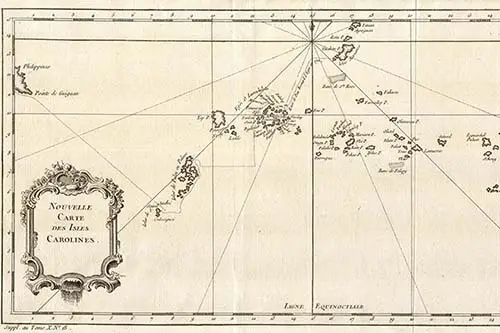
1668
Spanish explorer Francisco Lazcano named Chuuk, Kosrae, Palau, Pohnpei, and Yap “Islas de Carolinas” after King Carlos II of Spain. For about 300 years after this, explorers passed by having little contact with islanders. Image information: Caroline Islands courtesy of Dr. Don Rubinstein.
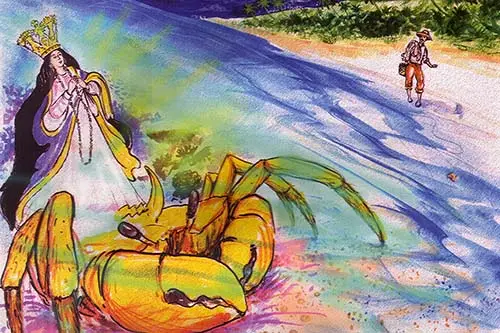
1690
Santa Marian Kamalen statue is found in Malesso' after the galleon Nuestra Señora del Pilar shipwrecked off Cocos Island. Image information: Santa Marian Kamalen courtesy of the Department of Chamorro Affairs.
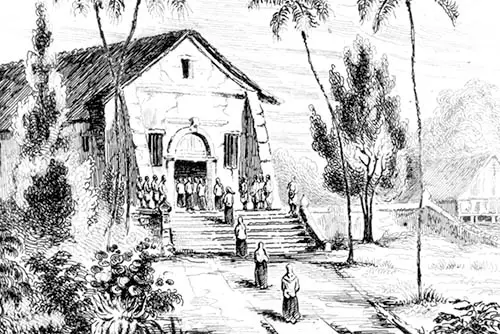
1695
Priests working to convert CHamorus/Chamorros to Christianity are met with resistance. Chamorros accept some but not all of their teachings. Once Padre San Vitores is killed, soldiers are brought to subdue the uprising. Many are killed. A last battle at Aguijan ends in defeat and the Spanish gain control over the Marianas. Image information: Humåtak Church courtesy of the Micronesian Area Research Center (MARC).
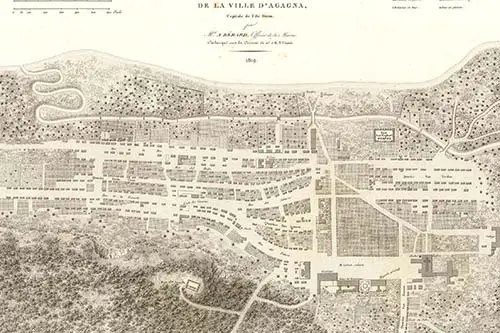
1698
CHamorus/Chamorros fought the Spanish for control of the Marianas for almost 30 years. At the same time introduced diseases were taking their toll on people as they had no resistance to diseases. After the rebellion was quelled the Spanish forced Chamorros from the northern islands to relocate to Guam and Rota. Image information: Map of Hagåtña, 1819; courtesy of the Guam Public Library System.
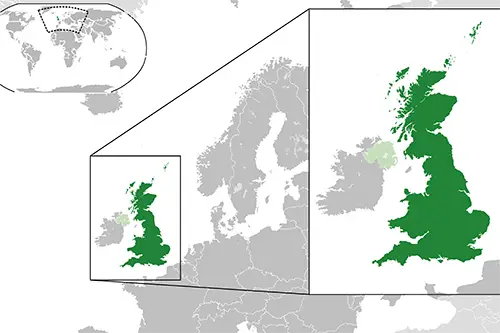
1707
The Acts of Union, passed by the English and Scottish Parliaments in 1707, led to the creation of the United Kingdom of Great Britain. The UK Parliament met for the first time in October 1707. Image information: England, Scotland, and Wales.
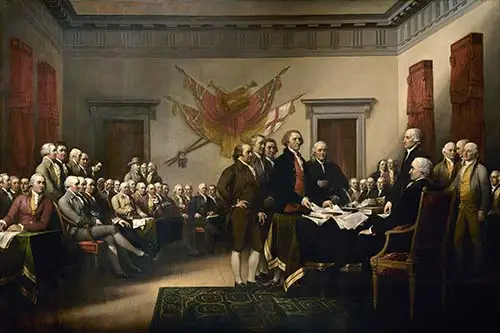
1776
This declaration announced that the 13 colonies at war with the Kingdom of Great Britain would regard themselves as no longer under British rule. With the declaration, these new states took a collective first step toward forming the United States of America. It has become a well-known statement on human rights. Image information: Declaration of Independence.
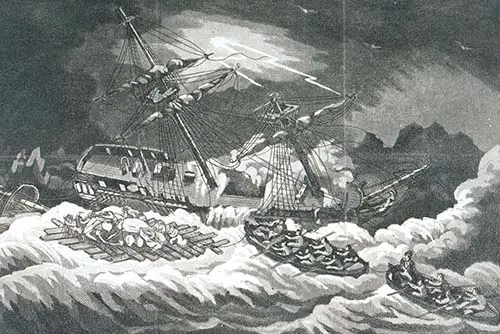
1783
A British ship, the Antelope, is wrecked on Palau. Storyboards were first made as souvenirs at this time. Lee Boo, the son of the Ibedul, ruler of Koror, Palau, was taken to London by a British sea captain, Henry Wilson, to learn more about Europe. He died of Smallpox there a year later. Image information: Wreck of the Antelope.
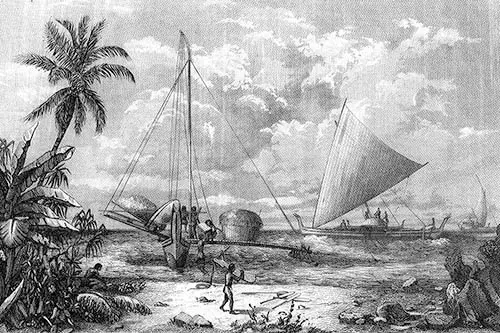
1787
Ancient trading voyages from the Carolines to Guam are resumed after more than 100 years. Carolinians from the atolls of Lamotrek, Satawal, Elato, and Woleai sailed into Talo’fo’fo’ Bay in Guam. Luwito, the Carolinian navigator, said they had arrived in Guam using directions from an ancient chant. Image information: Waa (Canoe) of the Caroline Islands courtesy of the Spanish Documents Collection at the Micronesian Area Research Center (MARC).
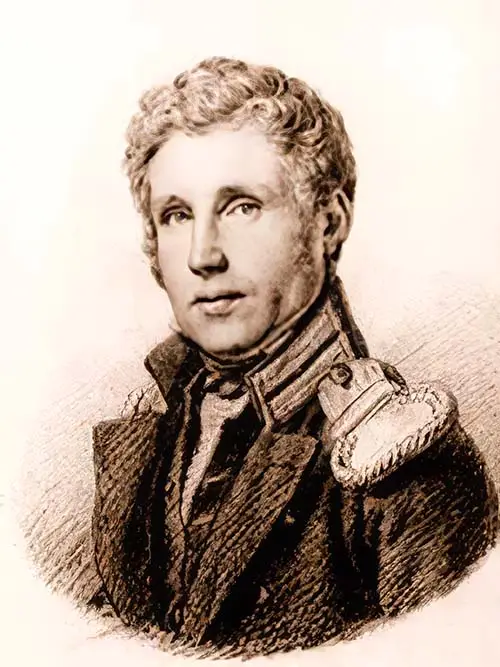
1816
Russian Otto von Kotzebue leads a scientific expedition through the Marshalls. He stays for a month on the atoll of Wojja and leaves plants and animals with the islanders there. Image information: Otto von Kotzebue.
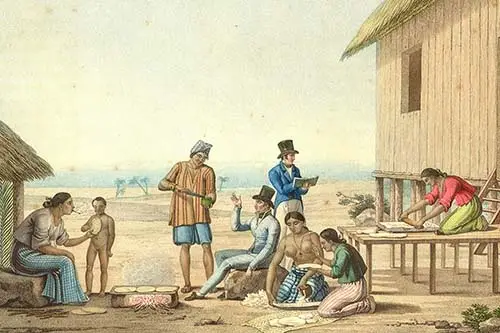
1819
Frenchman Louis Claude de Freycinet visits the Marianas, documenting the lifestyle, plants, animals of the time. Image information: Hagåtña House Chores, 1824, courtesy of the Guam Public Library System.
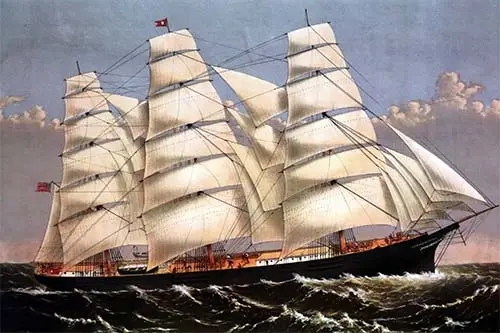
1820
Whaling ships begin to appear in Micronesia, stopping on Guam for supplies and recruiting crew. Whales were hunted near Kosrae, Pohnpei, the Northern Marianas and the Marshalls for about 40 years. Image information: Chipper Ship Three Brothers courtesy of Jillette Leon-Guerrero.
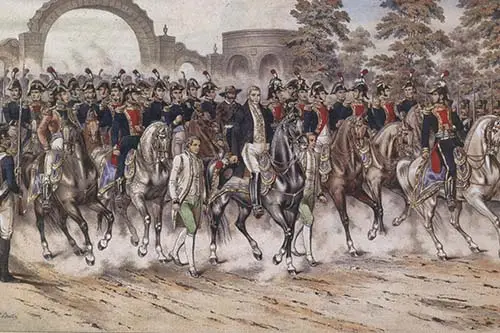
1821
The Mexican War of Independence ended the rule of Spain in the territory of New Spain. The move for independence was inspired by the Age of Enlightenment and the American and French Revolutions. Social and political changes and a deep economic crisis in New Spain caused discomfort among the elite. Image information: Generals of the Army of the Three Guarantees.
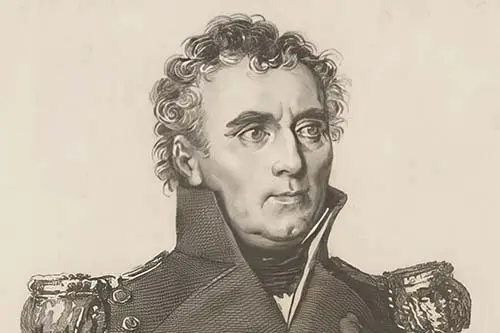
1824
French Captain Louis Duperrey at Kosrae arrives on a scientific expedition aboard the ship Coquille. He and his crew stay in Kosrae for ten days. They bring the first pig and metal to the island. When Duperrey’s expedition leaves Kosrae, it moves to Chuuk, where Duperrey makes the first map of Chuuk. Image information: Louis Isidore Duperrey.
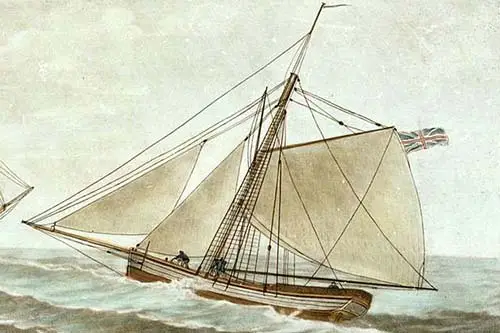
1836
Captain CH Hart and his crew sail to Sapwuahfik, Pohnpei aboard trading cutter Lampton of Sydney, Australia, on a trading mission. Hart and his crew were chased off the island. A year later, they returned. Two days of fighting left most of the islanders dead. Image information: An Homeward Bound East-Indiaman Taking A Pilot on Board.
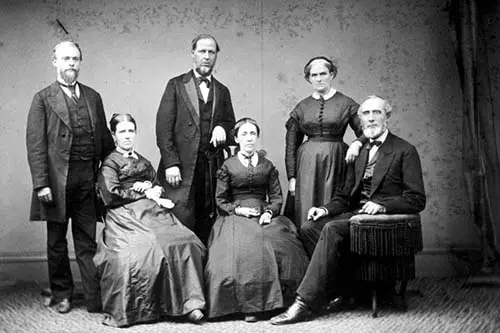
1852
American protestant missionaries arrive in Pohnpei. Congregational Churches were established on Pohnpei, Kosrae, the Marshalls and Kiribati. By the end of the century Congregational Churches were established throughout eastern Micronesia along with the Marshall Islands, Nauru and Kiribati. Image information: American Missionaries to Ponape, Micronesia, 1852.
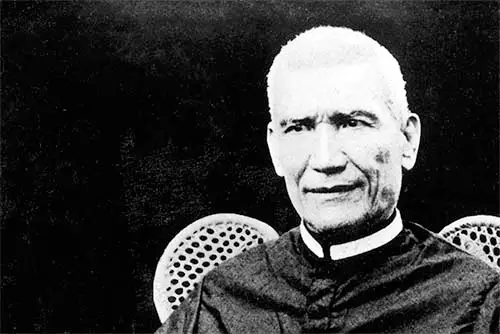
1859
Jose Torres Palomo is ordained as the first CHamoru/Chamorro Catholic priest. His parents died during the Smallpox epidemic in 1856 along with 5,532 others on Guam. Palomo was widely regarded as one of the wisest and most educated men on Guam and was fluent in Spanish, Chamorro, English, French, and Carolinian. Image information: Padre Palomo courtesy of the Micronesian Area Research Center (MARC).
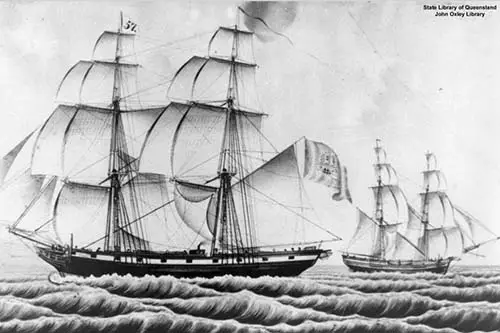
1860
Traders were in Micronesia at the same time as the whalers and missionaries, but it was around 1860 that trading activity became more widespread. Germans, Japanese and American traders mostly operated in the Marianas, the Marshalls, Kosrae, Pohnpei, Yap, and Palau. Chuuk had fewer traders. Image information: Cesar & Helene (ship).
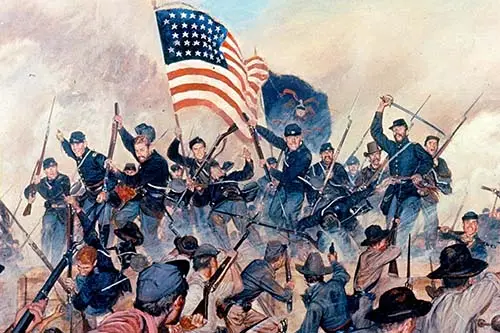
1861-1865
War broke out over the enslavement of black people shortly after US President Abraham Lincoln was inaugurated. The loyalists of the Union in the North proclaimed support for the Constitution. They faced secessionists in the Confederate States in the South, who advocated for states’ rights to uphold slavery. Image information: First at Vicksburg.
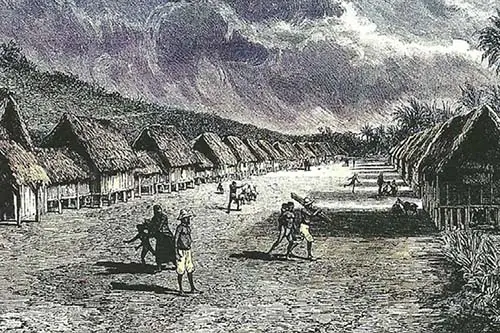
1865
Some CHamorus/Chamorros begin to move back to Saipan from Guam, 67 years after the Spanish forced their families to leave the island. Image information: Village of Garapan in 1887.
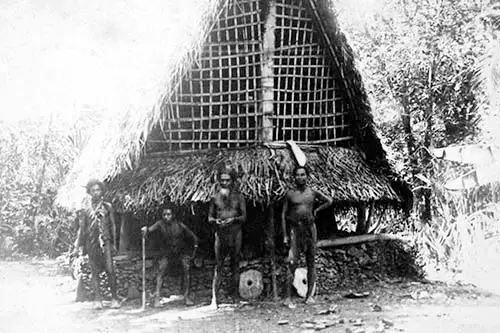
1871
Irish American David O’Keefe washes ashore on Yap after a storm wrecked the ship he was traveling on. He eventually brings about a new trade route in the region. Image information: Yap from the Adolf Raitz von Frentz collection.
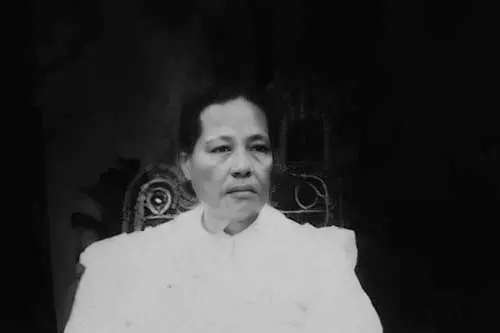
1875
CHamoru/Chamorro Bartola Garrido moves to Yap and opens a school for girls. She later claims the island group for Spain. She was a devout Catholic and deeply loyal to Spain. Image information: Bartola Garrido courtesy of the Micronesian Area Research Center (MARC).
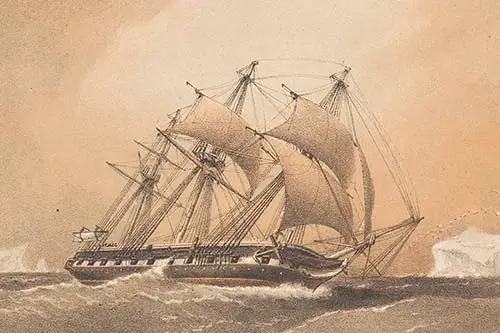
1875
The depth of the Marianas Trench is first sounded by the crew of the HMS Challenger, using a weighted rope which recorded a depth of 4,475 fathoms (26,850 feet). In 1877, a map was published showing the location of the sounding. Image information: HMS Challenger.
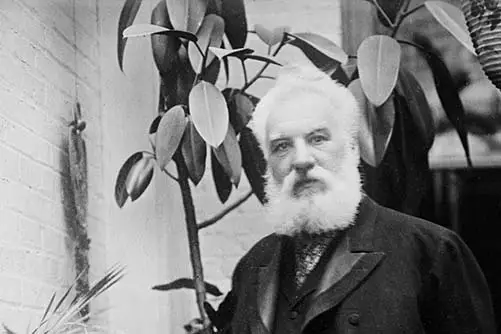
1876
Alexander Graham Bell receives a patent for his revolutionary new invention, the telephone, at age 26. Bell wanted to improve on the telegraph by creating a device that combined aspects of the telegraph and record player to allow people to speak to each other from a distance. Image information: Alexander Graham Bell.
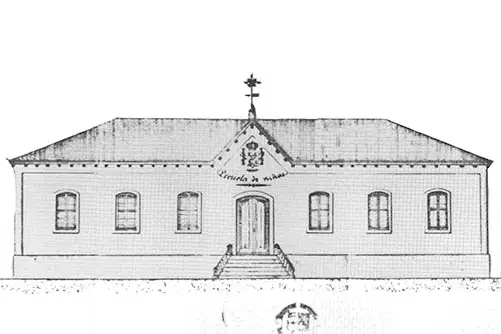
1879
Escuela de Niñas, the first school for girls, opens on Guam. The teachers are paid from an endowment from Queen Mariana of Austria, Spain’s queen regent. One teacher and an assistant taught the young ladies, ages four to eleven. The curriculum consisted of Christian doctrine, reading, writing, arithmetic and sewing. Image information: Escuela de Niñas courtesy of the Micronesian Area Research Center (MARC).
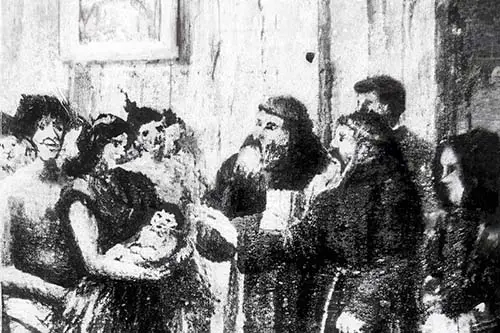
1885
Spain’s claim to Yap over Germany is officially settled. Soon Spanish Capuchin missionaries are in most Micronesian islands to establish Catholicism. In Yap and Palau this was their first introduction to Christianity. The other islands in the region were introduced to Christianity by American protestants 20 or 30 years prior. Image information: Baptism of the First Yapese Child.
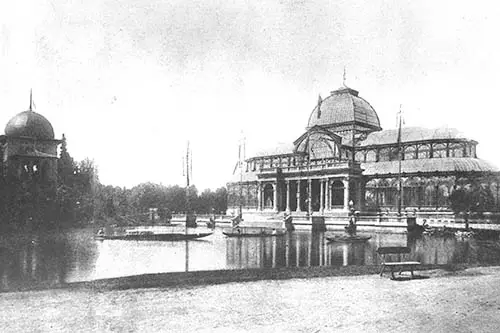
1887
People from Spain’s Pacific colonies are taken to Spain for an exposition, including two CHamorus/Chamorros from Guam and two Carolinians. The Philippine Exposition was held at the Crystal Palace in the Retiro of Madrid, Spain. The buildings are still there. Image information: Crystal Palace courtesy of the Micronesian Area Research Center (MARC).
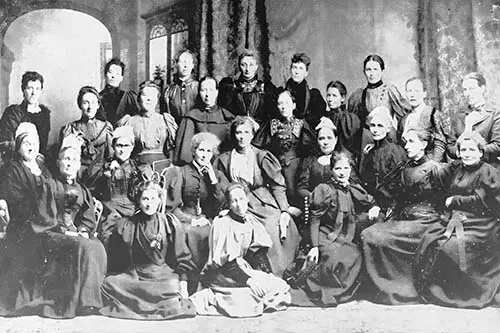
1893
New Zealand becomes the first country in the world to grant women the right to vote. The governor, Lord Glasgow, signed a new Electoral Act into law making for a radical change. Many other democracies did not allow women to vote till decades later. Image information: National Council of Women, Christchurch, 1896.
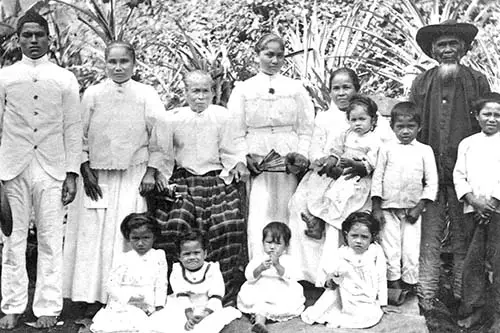
1894
A group of CHamorus/Chamorros from Guam move to Palau to produce copra in a joint venture with American trader David O’Keefe. Palauans allowed them to use land for copra plantations. The families stay on Palau until the end of World War II. Some married Palauans and live there still. Image information: de Rosario Family courtesy of the Micronesian Area Research Center (MARC).
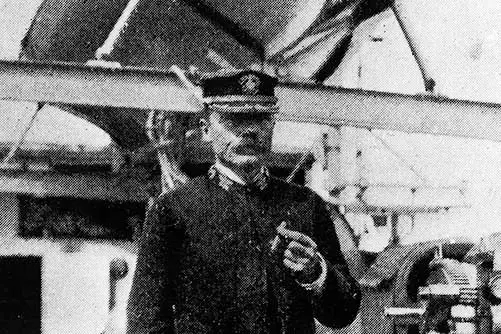
1898
The Treaty cedes Guam, Puerto Rico, and the Philippines from Spain to the US. Six months later Captain Henry Glass arrived on Guam aboard the USS Charleston to claim the island. Governor Juan Marina had no idea his country was at war with the US. Image information: Captain Henry Glass from the Guam Public Library System.
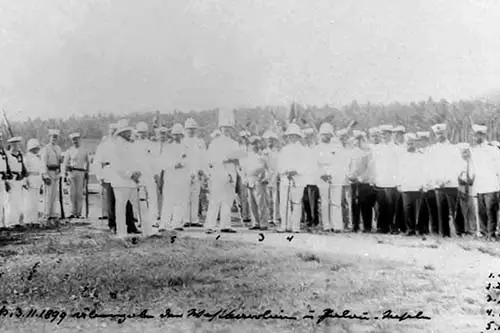
1898
It was the end of the Spanish empire in the Pacific and as Germany wanted a colonial empire, they bought the islands. Kaiser Wilhelm II at the time was building a new high seas navy. Saipan became the administrative center. The Germans built schools, a hospital, and other public buildings. Image information: Handover Ceremony.
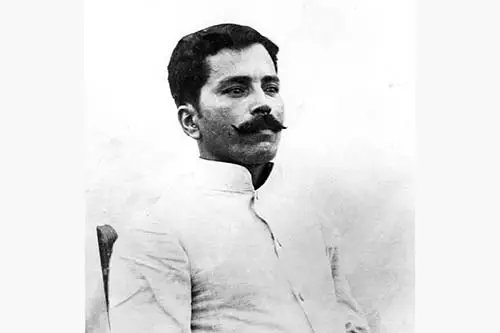
1899
Two CHamoru/Chamorro brothers, Jose and Luis (Castro) Cusino, return to establish the first protestant church on Guam. They had left the island years before to work as whalers, settling in Hawai`i and becoming Protestants. Hearing that their birthplace had become an American territory, they decided to return to Guam to evangelize. Image information: Luis Custino courtesy of the Micronesian Seminar (MicSem).
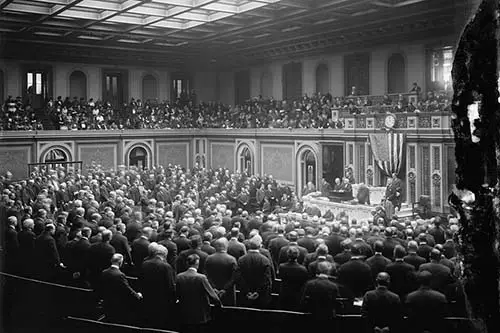
1901
Guam leaders sought self-government through a formal petition, shortly after they became subjects of the American empire. It was sent to US Congress in 1901, signed by 32 residents. The petition asserted the belief that the conditions instigated by the new naval government and the structure of the government itself were defective. Image information: US Congress.
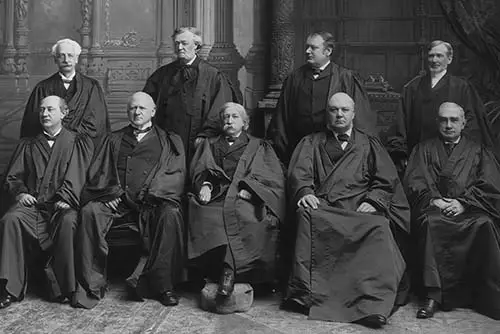
1901
The Insular Cases, a series of opinions by the US Supreme Court regarding the status of US territories, are issued. They respond to the question of how American rights apply to those in US territories. In short, the opinions said that the US Constitution does not automatically extend to territories. Image information: The Fuller Court (1898-1902).
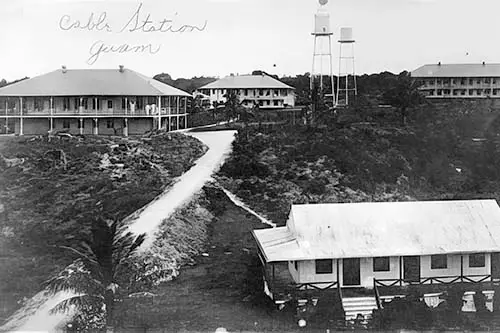
1903
The first telephone calls were made through the privately built Transpacific Cable Station at Sumai/Sumay. It was the first telephonic communications in the region. Guam was an important part of the East-West trade route because of its location, its deep water harbor and because of the plentiful fresh water supply. Image information: Cable Station, 1905, courtesy of James Oelke-Farley.
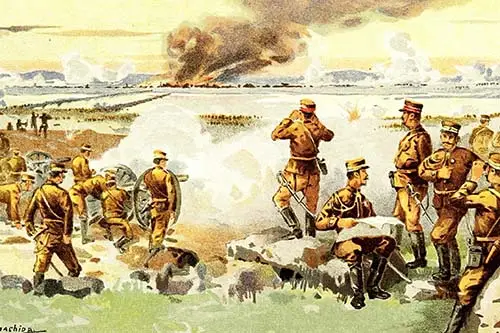
1904-1905
The Russo-Japanese War is fought in which, for the first time, an Asian power defeats a modern European power. A victorious Japan forced Russia to abandon its expansionist policy in the Far East. Image information: The Russo-Japanese War.
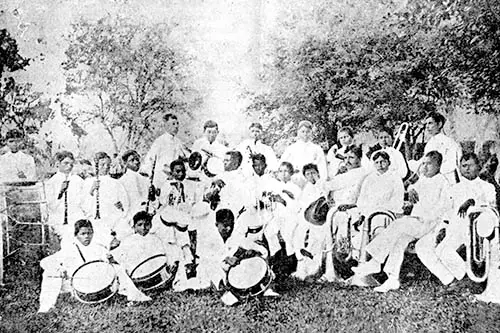
1905
The Insular Force Navy Band, also called the Guam Band, was made up of a mixture of mostly CHamorus/Chamorros, a few Filipinos and three Italian immigrants. The band played regularly at the Plaza de España. Image information: First Chamorro Band, 1905, courtesy of the Micronesian Area Research Center (MARC).
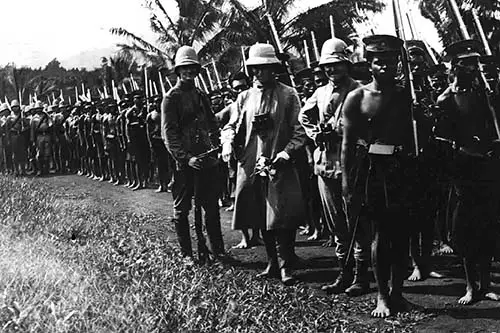
1910
A group of Pohnpeians rise up against German rule in the Sokehs Rebellion. A trial was convened for the 36 rebels. Seventeen were convicted for the murder of four German officials and five boatmen and insurrection, and condemned to death. Twelve other received multi-year sentences of hard labor. Image information: Sokehs Rebellion.
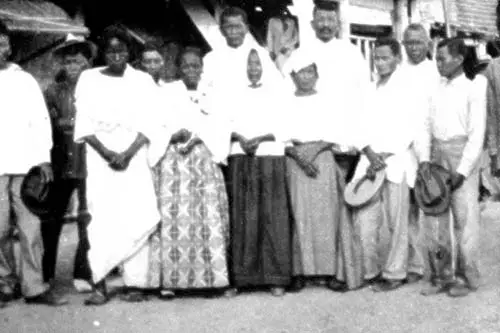
1912
The Navy forcibly relocates 18 CHamorus/Chamorros with Hansen’s Disease (leprosy) to Culion Island, Philippines. They had previously been confined at a colony in Tumon. Most would never see their families again. At Culion, Chamorros found themselves in isolation, unable to communicate with other patients. Image information: Chamorro Patients at Culion "Leper Colony," Philippines, courtesy of Dr. Anne Perez Hattori.

1914
A German Naval ship, the SMS Cormoran II, sails into Apra Harbor in desperate need of fuel. As the US Navy refuses to give up their coal supply, the ship is marooned on Guam with its crew of 370 men. They were treated with hospitality and friendship. Image information: SMS Cormoran II courtesy of the War in the Pacific National Historical Park (WAPA).
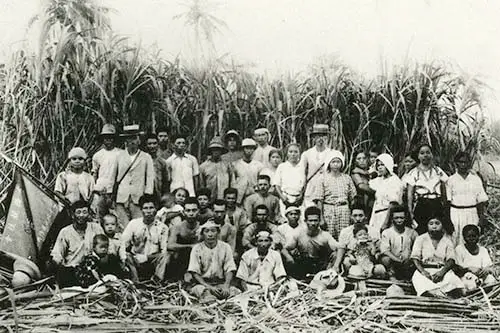
1914
Japan takes control of German and Spanish possessions in Micronesia, including all of the Micronesian islands except Guam, which is under US control. The move was considered a political and economic necessity for expansion. The earliest Japanese migrants to Micronesia worked as traders and then as fishermen, farmers, and laborers. Image information: Sugarcane Farmers courtesy of the Micronesian Area Research Center (MARC).
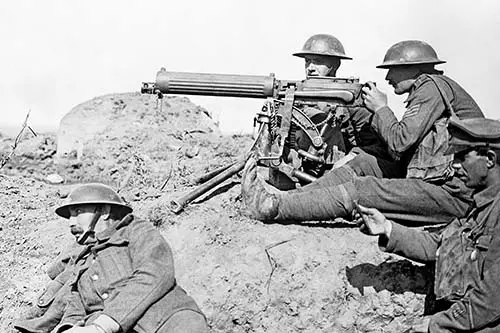
1914-1918
World War I was an international conflict that involved most of Europe along with Russia, the US, the Middle East, and other regions. The war pitted the Central Powers—Germany, Austria-Hungary, and Turkey—against the Allies—mainly France, Great Britain, Russia, Italy, Japan, and, from 1917, the US. The Allies won. Image information: Vickers Machine Gun in the Battle of Passchendaele.
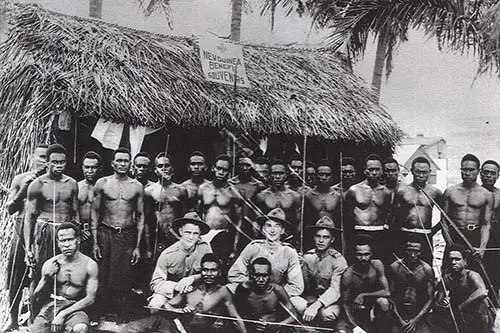
1917
The first shot by Americans during WWI is fired over the bow of the SMS Cormoran as it is scuttled in Apra Harbor, Guam. About 370 crew members became prisoners of war and taken to the US. The four Chinese and 29 New Guinean crew members were sent back to their homes. Image information: SMS Cormoran Crew courtesy of Don Farrell.
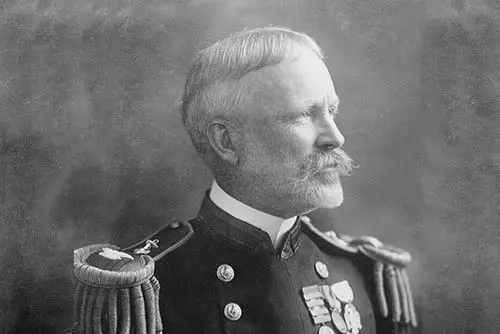
1917
In 1917, Guam Naval Governor Roy C. Smith banned speaking CHamoru/Chamorro. He said English was the only official language and that Chamorro must not be spoken except for official interpreting. Speaking Chamorro was also forbidden in schools, playgrounds and baseball fields. Students were reprimanded and fined for speaking their native language. Image information: Captain Roy Campbell Smith.
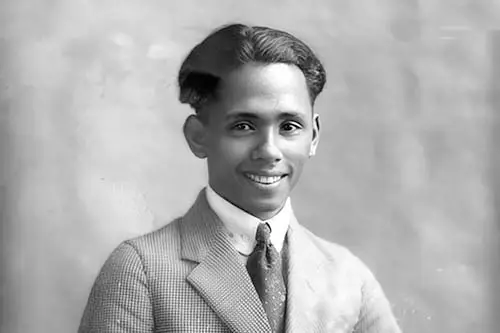
1919
Ramon Sablan wrote the Guam Hymn, “Stand Ye Guamanians” while he was a young man. He later went on to become the first CHamoru/Chamorro medical doctor. He wrote the song in English as this was a time when the island was administered by the Navy and speaking Chamorro was discouraged. Image information: Young Ramon Sablan, family collection.
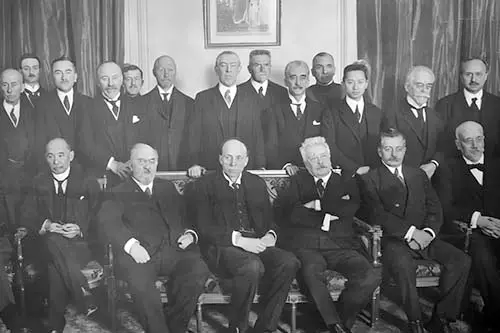
1919
The League of Nations awards all of Germany’s possessions in the Pacific located north of the equator under mandate to Japan. Garapan, Saipan is developed as the regional capital, and numerous Japanese, Koreans, Okinawans, and Taiwanese migrate to the islands. Image information: League of Nations Commission.
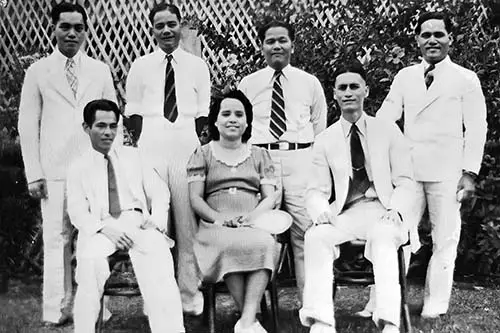
1926
The Guam Teachers Association begins planning for a Guam Museum. The teachers believed it was important to gather materials for future generations to know their past. They sponsored the first collection of natural and scientific specimens, works of art and literary curiosities for future study of the island’s history. Image information: Guam Teachers Association courtesy of the Sanchez Collection.
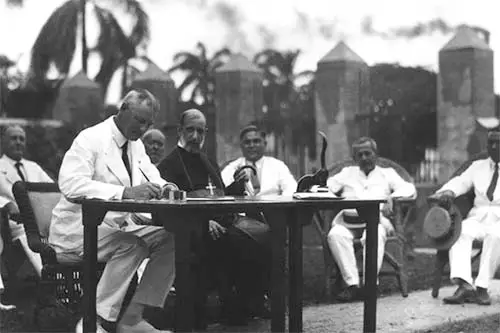
1930
US Naval Governor Bradley supported CHamoru/Chamorro aspirations for citizenship and self-government. Bradley proclaimed a Bill of Rights for the people of Guam without waiting for federal approval. Despite Bradley’s efforts, however, US citizenship and a bill of rights for Chamorros were not approved at the federal level. Image information: Gov. Bradley Signs Bill of Rights courtesy of the Micronesian Area Research Center (MARC).
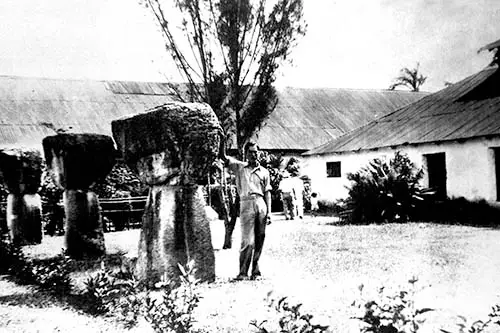
1932
A small Guam Museum opens in Hagåtña under the direction of the American Legion. Artifacts and historical items collected by teachers and students were put on display and used to teach about the island’s history. Image information: Guam Museum courtesy of Don Farrell.
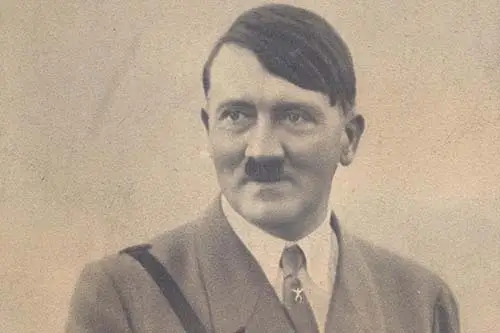
1933
Adolf Hitler, leader of the National Socialist German Workers Party (or Nazi Party), is named chancellor of Germany. Hitler’s rise to prominence in Germany was spurred by the people’s frustration with economic conditions and the defeat in the Great War and the harsh peace terms of the Versailles treaty. Image information: Adolf Hitler.
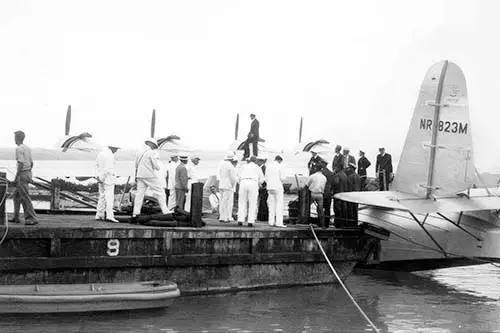
1935
The Pan American Clipper Service started flying a San Francisco to Manila route with stops at Midway, Wake and Guam. These were seaplanes that could land on the calm lagoons of the Pacific Islands. On Guam they landed at Apra Harbor where guests stayed at the Pan Am Hotel, Sumay. Image information: Pan American Clipper, 1935, courtesy of ROD Sullivan.
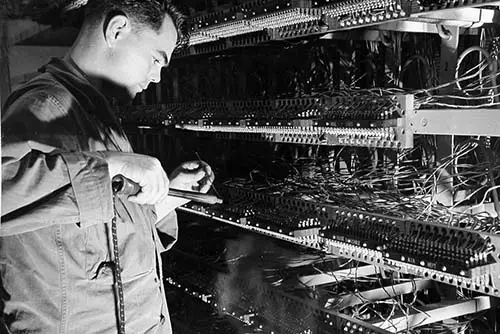
1936
The first telephone contact with the outside world from Guam was made on 16 May 1936 when US Navy First Class Radioman AB Carter with his ham station, call letters unknown, worked V6LLQ in California. Image information: Telephone Exchange from Micronesian Seminar (MicSem).
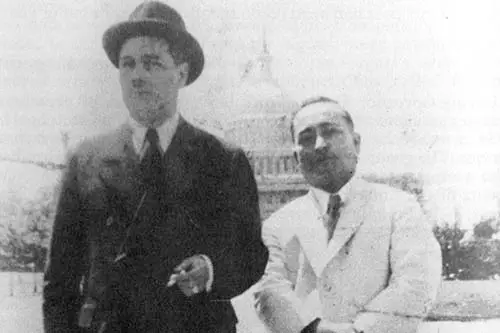
1936
The 2nd Guam Congress sends Francisco B. Leon Guerrero and Baltazar J. Bordallo to lobby in Washington DC for citizenship. There was an island-wide drive to collect donations for the lobbying trip in 1936 with about $6,000 collected. With government funding unavailable, Leon Guerrero sold family land to help pay the estimated $10,000 cost of the trip. Image information: BJ Bordallo and FB Leon Guerrero in Washington, DC courtesy of the Sanchez Collection.
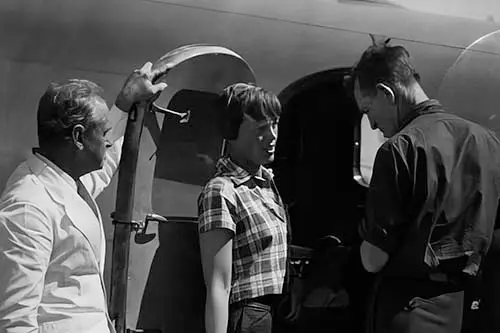
1937
Aviation pioneers, Amelia Earhart and Fred Noonan, disappear in the Pacific while attempting to make a circumnavigational flight of the globe. Earhart was the first female aviator to fly solo across the Atlantic Ocean. Fascination with her life, career and disappearance continues to this day. Image information: Earhart and Noonan.
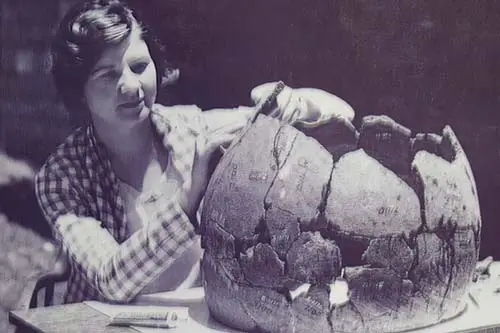
1938
Anthropologist Dr. Laura Thompson is brought to Guam to study the CHamoru/Chamorro people at the request of the Navy. Thompson was stationed in Hagåtña but soon set up field headquarters in Malesso’ at the south of Guam. She wrote a book “Guam and Its People” from her findings. Image information: Dr. Thompson Mending Clay Pot courtesy of Dr. Rebecca A. Stephenson.
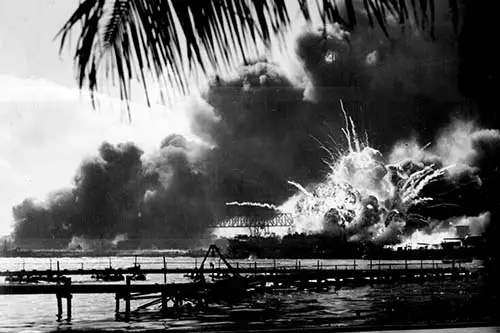
1939-1945
World War II was a global war that lasted six years. The vast majority of the world’s countries—including all the great powers—eventually formed two opposing military alliances: the Allies and the Axis. A state of total war emerged, directly involving more than 100 million people from over 30 countries. Image information: USS SHAW.
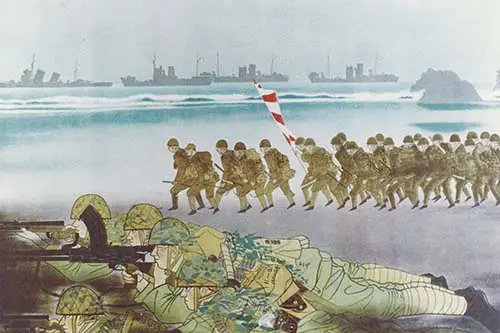
1941
Terror gripped the people of Guam as Japanese warplanes bombed Sumai/Sumay and strafed Piti and Hagåtña on 8 December. A day later the planes returned striking military facilities and the Pan American Airways hotel in Sumai. On 10 December Japanese forces invaded Guam. American forces were outnumbered and the island was taken by the Japanese. Image information: Capture of Guam from the Guam Public Library System.
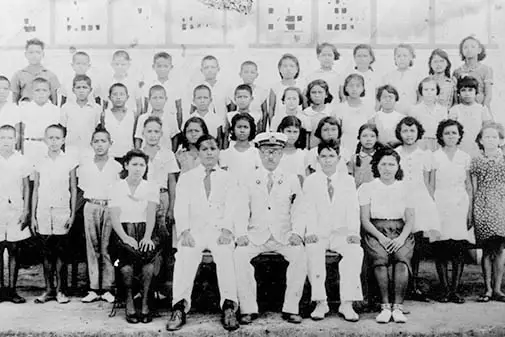
1942 - 1944
Peoples of Micronesia, including Guam, live under Japanese rule. The prosperous village of Sumay is evacuated by Japanese for their own use. 96,000 Japanese nationals live in Micronesia. Image information: Guam Japanese Department of Education courtesy of Sanchez Collection.
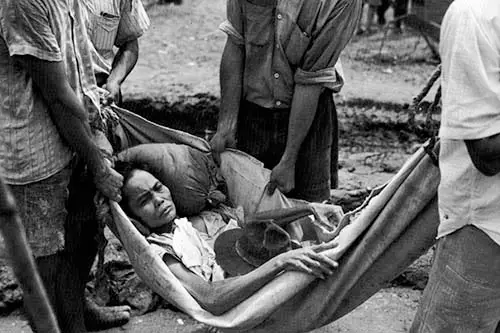
1944
CHamorus/Chamorros on Guam are forced to march to concentration camps, as dozens of others are massacred by Japanese soldiers. They are confined in the camps as the Americans invade Guam. The Americans battle the Japanese all over Micronesia until WWII is finally over, with the US prevailing. Image information: Manenggon Concentration Camp courtesy of Don Farrell.
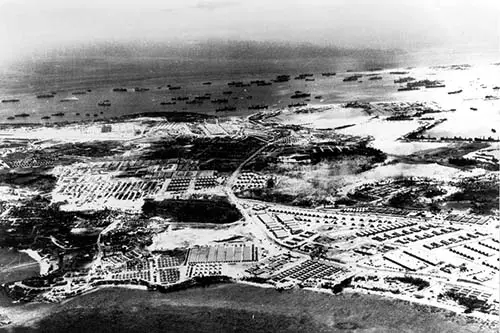
1945
When the Navy took back control of Guam the appointed naval governor immediately began condemning huge tracts of land, including whole villages. The US had flattened portions of Guam during the intense bombing, and now the naval government began changing the landscape of the island to build several military bases. Image information: Aerial Guam courtesy of Micronesian Seminar (MicSem).
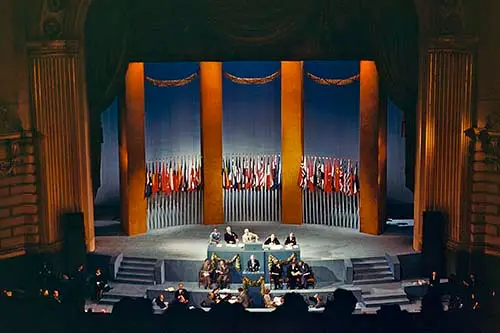
1945
The United Nations, an intergovernmental organization tasked to promote international co-operation and to create and maintain international order, is established in 1945. It was a replacement for the ineffective League of Nations. It created the Trust Territory of the Pacific Islands and assigned the US to administer Micronesia at the time. Image information: The San Francisco Conference, 25 April - 26 June 1945, United Nations Collection.
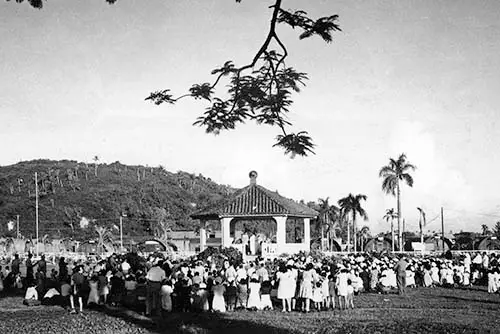
1945
After World War II was over community leader Agueda Iglesias Johnston convinces US military leaders on Guam to support a celebration to commemorate the Liberation of the island from the Japanese. This celebration continues to this day as one of Guam’s holidays—Liberation Day, which is celebrated on July 21st. Image information: First Liberation Day Celebration courtesy of the Sanchez Collection.
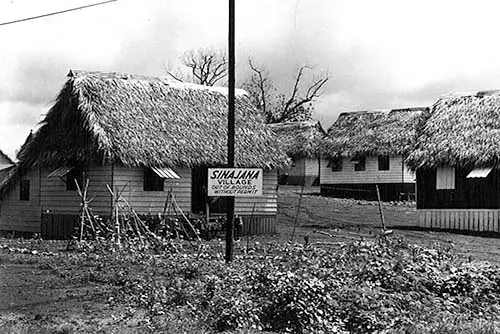
1946
Declared off-limits to resettlement, former Hagåtña residents move into areas where they had ranches before the war, especially Agana Heights, Sinajana, and Barrigada. Sumai/Sumay was taken over by the military for new bases as was Fena, Tiyan and land in Yigo. Some 300 business licenses were issued in 1946. Image information: Sinajana Village Out of Bounds from the Guam Public Library System.
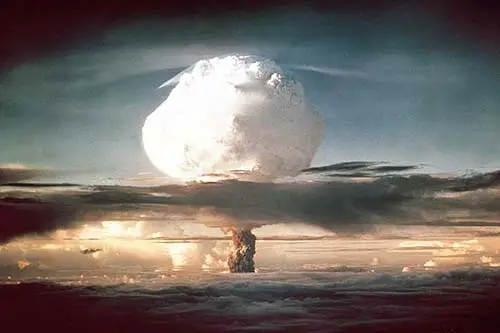
1946 - 1956
Nuclear testing at Bikini Atoll began with a series of 23 nuclear devices detonated by the US at seven test sites on the reef, the sea, in the air and underwater. Residents were assured they could return home after the test but that proved untrue as the island is uninhabitable. Image information: MIKE, Operation Ivy.
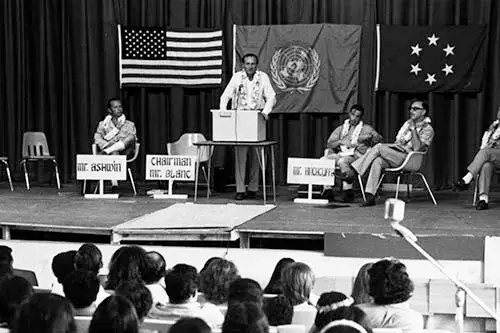
1947
The United Nations forms the Trust Territory of the Pacific Islands to be administered by the US. The Territory contained 100,000 people scattered over a water area the size of continental United States. They represent a variety of cultures and spoke nine languages. Image information: UN Team Addresses University of Guam Students.
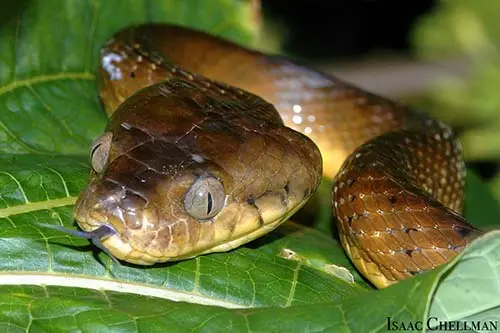
Late 1940s-Early 1950s
The Brown Treesnake is introduced to Guam aboard a military cargo ship, probably from Australia or Papua New Guinea, starting the decimation of Guam’s native birds. Image information: Brown Treesnake courtesy of Isaac Chellman.
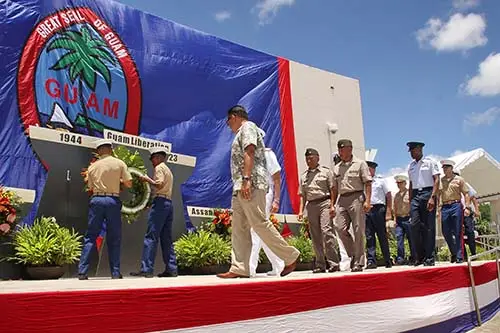
1948
While the Guam Flag dates back to 1917, a red border is added in 1948 to commemorate those lost in World War II. The addition was documented in the Guam Congress Bill No. 12 approved by Naval Governor Charles Pownall. World War II claimed 1,170 CHamoru/Chamorro lives. Image information: 79th United Memorial Ceremony by Ed San Nicolas.
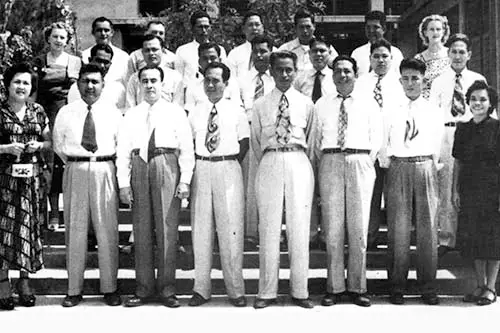
1949
Guam Congress walks out as a protest against the US Naval Government and to underscore its quest for self-government. The protest drew nationwide attention. The walkout was the most openly rebellious act that CHamorus/Chamorros had committed against any of their colonial rulers since the Chamorro-Spanish resistance in the late 1600s. Image information: House of Assembly 9th Guam Congress courtesy of the Sanchez Collection.
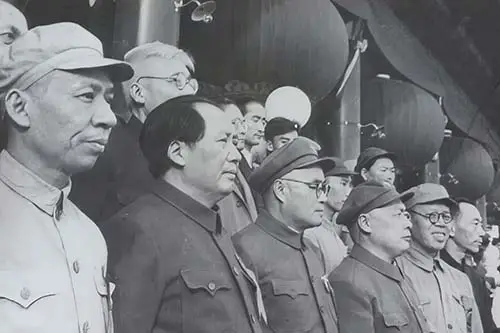
1949
Chinese leader Mao Zedong declares the founding of the People’s Republic of China. The party’s goal was an overhaul of the land ownership system and extensive land reforms. China’s old system of gentry landlord ownership of farmland and tenant peasants was replaced with a distribution system that reduced economic inequality. Image information: Founding of the People's Republic of China.
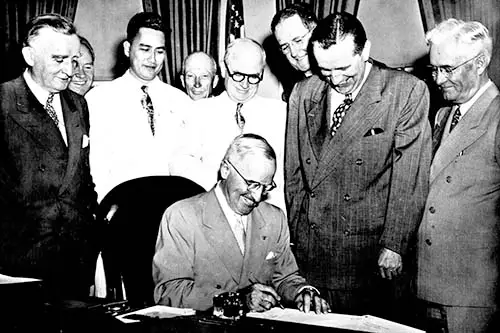
1950
An Organic Act for Guam, created by US Congress, goes into effect and civilian rule begins with appointed governors. Carlton Skinner is the first appointed civilian governor of Guam. Image information: Signing the Organic Act of Guam courtesy of the Micronesian Area Research Center (MARC).
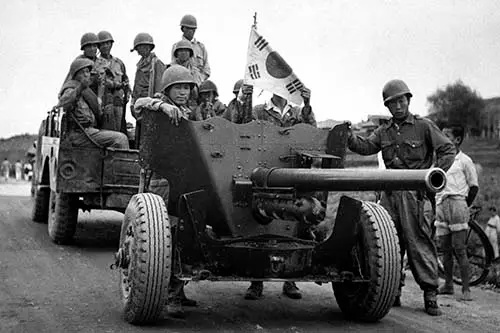
1950-1953
The Korean War, between North Korea (with the support of China and the Soviet Union) and South Korea (with support of the US), begins in 1950 when North Korea invades South Korea following a series of clashes along the border. Korea was split into two sovereign states. Both governments claim to be the sole legitimate government of all of Korea. Image information: South Korean Evacuation of Suwon Airfield.
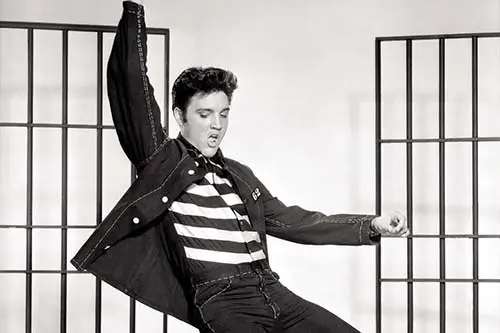
1950s
Rock n’ roll, an original music style, is created in the US and evolves by the mid-1960s into the international style known as rock. The seeds were in place for decades, but they flowered in the mid-1950s when nourished by a volatile mix of black culture and white spending power. Image information: Elvis Presley's Jailhouse Rock Promotion.
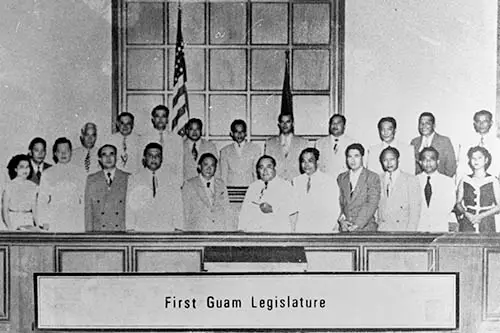
1950s
The First Guam Legislature is elected in 1950. The senators passed major laws such as: a uniform wage law eliminating higher wages for off-island government recruits; the reorganization of the island court system; the establishment of a merit system for government of Guam employees and the Government Employees Retirement law. Image information: Guam Legislature Collection.
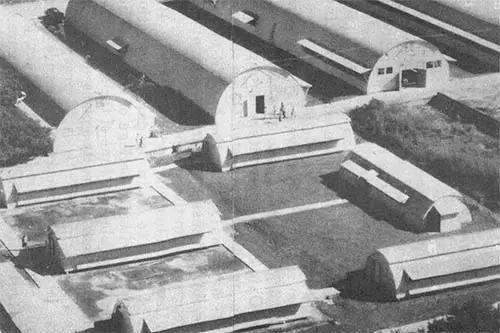
1952
The Territorial College of Guam is founded in 1952 as a two-year teacher-training school, established by Guam’s first civilian governor, Carlton Skinner. Its first president was IG Andrews. The College eventually becomes the University of Guam. Image information: Territorial College of Guam courtesy of the Micronesian Area Research Center (MARC).
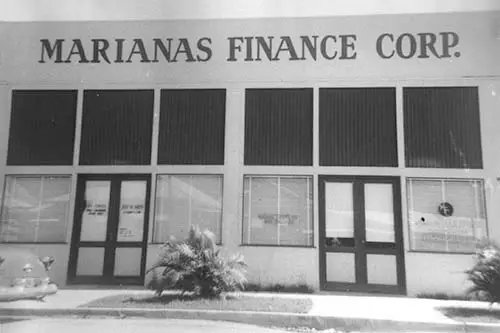
1954
Joseph Flores creates a joint venture to found Guam Savings and Loan in 1954. He and his partners sold about 125 shares to start the first financial institution chartered on Guam and the first to be locally owned. It was also the first to sell shares to the public. Image information: Marianas Finance Corp., courtesy of Philip Flores.
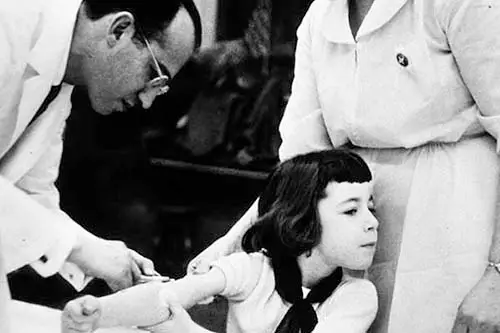
1955
Jonas Edward Salk, an American medical researcher and virologist, discovers and develops one of the first successful polio vaccines. Until 1955, when the Salk vaccine was introduced, polio was considered one of the most frightening public health problems in the world. Image information: Jonas E. Salk from the History of Medicine Collection.
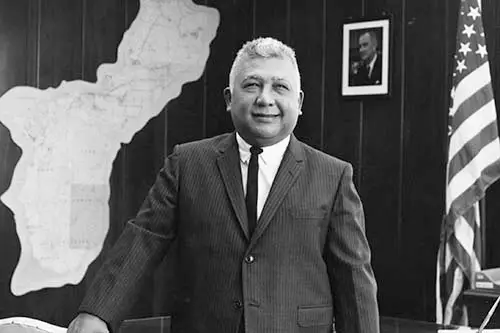
1962
President John F. Kennedy’s Executive Order 11045 rescinds the Navy’s wartime authority to refuse entry to civilian visitors for security reasons. The action unleashed the island’s tourism potential and ushered in an era of unprecedented economic and social advancement. The security clearance program was highly criticized by Guam’s leaders. Image information: Governor Manuel Guerrero courtesy of the Micronesian Area Research Center (MARC).
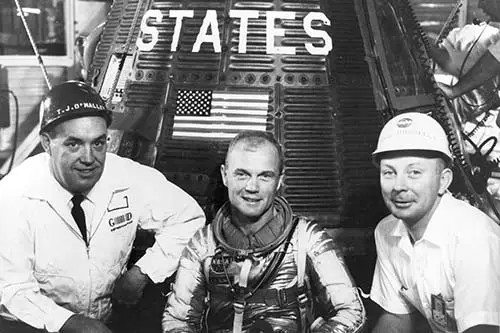
1962
NASA launches one of the most important flights in American history, to send a man to orbit Earth, observe his reactions and return him home safely. John Glenn, the pilot, became a symbol of American ambition. In 4 hours and 56 minutes, Glen circled the globe 3 times. Image information: Friendship 7, NASA.
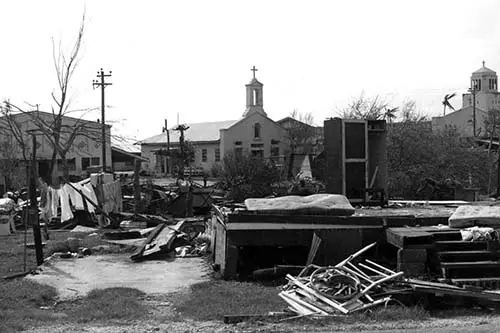
1962
Typhoon Karen devastates Guam with wind gusts estimated up to 185 mph. Nearly all island homes were damaged or destroyed, leaving at least 45,000 people homeless and 11 dead. Communication and utilities were crippled. It is the first time US federal disaster assistance was offered, ushering in concrete houses. Image information: Typhoon Karen damage to the village of Yona. Image information: Yona After Typhoon Karen courtesy of the Micronesian Area Research Center (MARC).
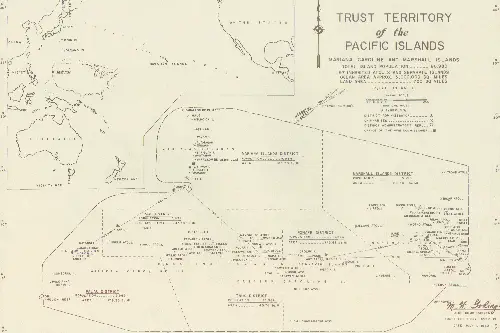
1963
The Solomon Commission’s report to President Kennedy brings US government attention to the Trust Territory of the Pacific Islands (TTPI). Commission recommendations had a significant impact in Micronesia. For instance, one recommendation said that there was a need for a TTPI legislature with local representatives from all six districts (Northern Marianas, Palau, the Marshalls, Yap, Pohnpei, Kosrae, and Chuuk). Image information: Map of TTPI.
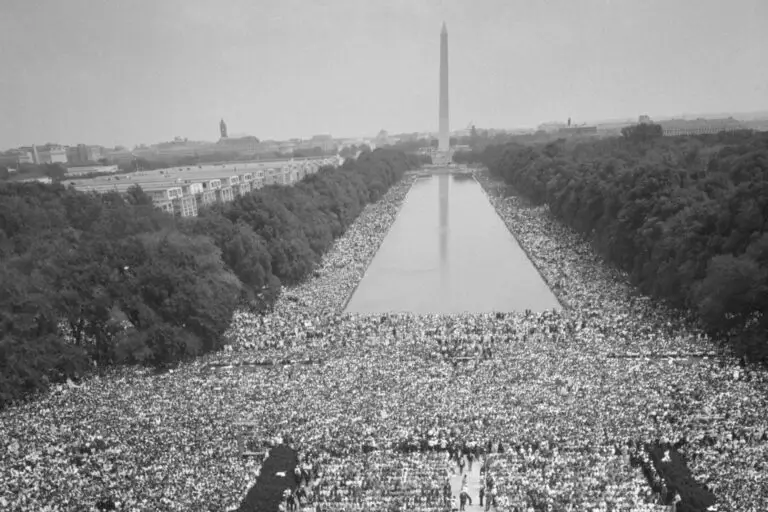
1963
A civil rights rally is held by 250,000 people in front of the Lincoln Memorial in Washington DC to draw attention to continuing challenges and inequalities faced by African Americans 100 years after emancipation. It was also the occasion of Martin Luther King, Jr.’s now-iconic “I Have A Dream” speech. Image information: Civil Rights March on Wash[ington], D.C.
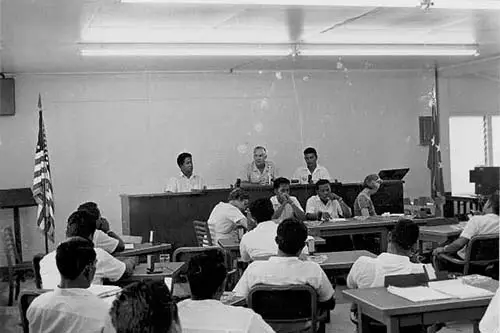
1964
US President Lyndon Johnson approves the establishment of the Congress of Micronesia. Representatives to the Congress are elected from the six districts of the of the Trust Territory of the Pacific Islands (TTPI). The six districts were the Northern Marianas, Palau, the Marshalls, Yap, Pohnpei, Kosrae, and Chuuk. The first meeting of the Congress of Micronesia is held in Saipan in 1965. Image information: Congress of Micronesia.
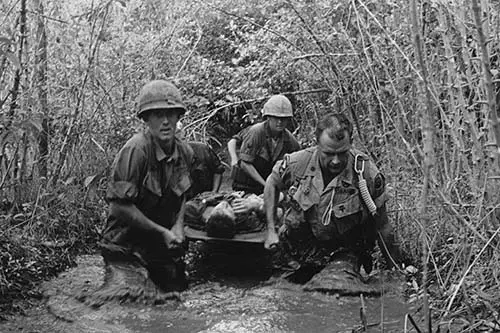
1965-1975
The Vietnam War was a conflict in Vietnam, Laos and Cambodia. The North Vietnamese army was supported by the Soviet Union, China and other communist allies. On the other side, the South Vietnamese army was supported by the US, South Korea, Australia, Thailand and other anti-communist allies. Bombing missions flew from Guam and many CHamorus/Chamorros lost their lives fighting in Vietnam. Image information: Soldiers Carry a Wounded Comrade Through a Swamp.
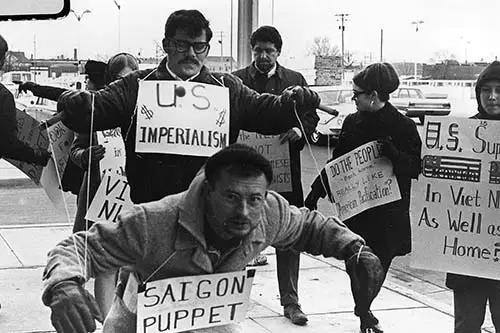
1965
The Anti-Vietnam War protest movement began mostly on college campuses and then spread to become one of the largest social movements of its time. Women’s rights, Black Power and Native people’s rights were all getting started at the same time. The protests attracted a widening support for several years. Image information: Vietnam War Protesters.
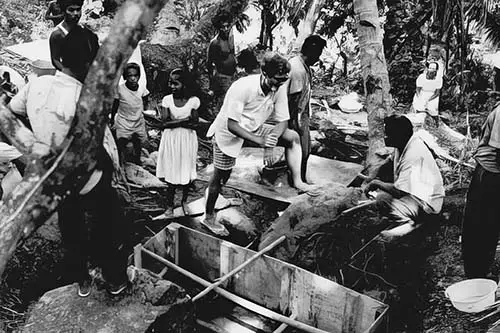
1966
Peace Corps volunteers begin arriving in many islands of Micronesia. They shared western ways, both good and bad, helping along many social and economic changes of the times. Image information: Peace Corps Volunteer.
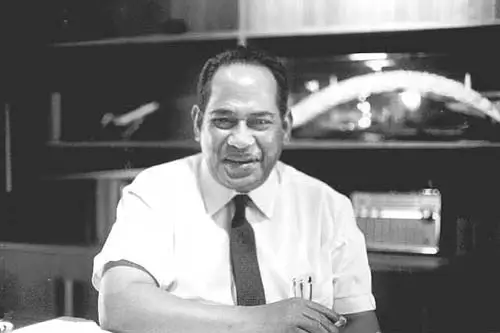
1966
Nauru becomes the world’s smallest independent republic following a two-year constitutional convention. Hammer DeRoburt is chosen as its first president. Image information: President Hammer DeRoburt of Nauru.
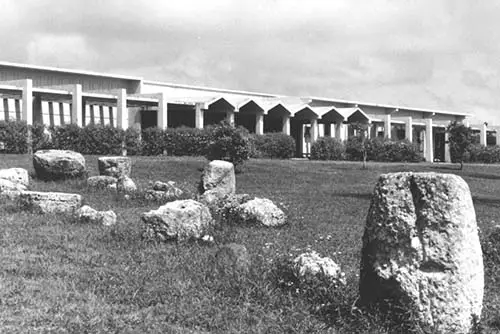
1967
Dr. Antonio C. Yamashita, president of the then-College of Guam, gathers noted scholars of Guam together to discuss the need to establish a research library in and about Micronesia in 1967. A year later the Micronesian Area Research Center opened. Image information: Courtesy of the Micronesian Area Research Center (MARC).
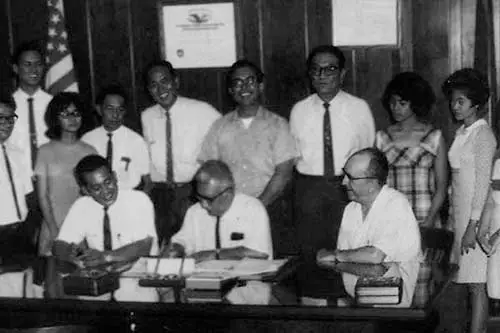
1968
In 1965, the College of Guam was accredited as a four-year, degree granting institution. Located in Mangilao, it became the University of Guam in 1968. Enrollment had reached 1,800 students while staff and faculty totaled more than 130. Image information: College of Guam courtesy of the Micronesian Area Research Center (MARC).
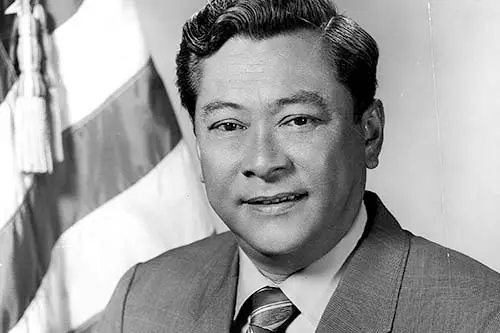
1968
The Guam Elective Governor Act by US Congress passes in 1968. It granted the people of Guam the authority to elect their Governor and Lieutenant Governor. Carlos Camacho, who was serving as Guam’s last appointed governor, was elected as its first Governor of Guam. Image information: Governor Carlos Camacho courtesy of the Guam Public Library System.
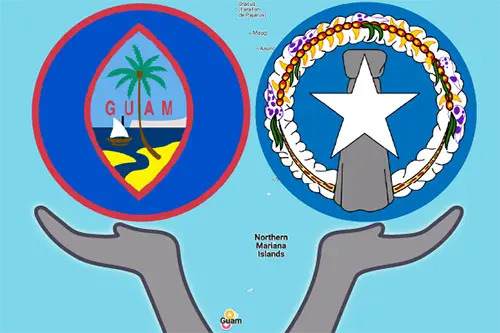
1969
In 1968, the Second Mariana Islands District Legislature adopts a resolution requesting that the US congressional visiting team urge US citizenship for the inhabitants of the Northern Mariana Islands and reunification of the Marianas. A vote taken on Guam in 1969, however, rejected the effort though the voter turnout was low. Image information: Guampedia graphic.
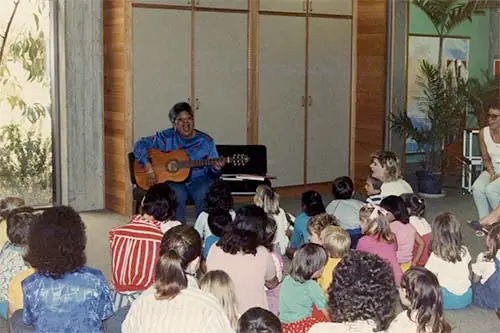
Early 1970s
A Chamorro Language and Culture Program is added to Guam’s public school curriculum under the leadership of Clotilde "Ding" Castro Gould. She helped develop the CHamoru/Chamorro language curriculum for the elementary schools and train teachers for the new curriculum. Image information: Clotilde Gould in Classroom courtesy of Sandy Gould-Yow.
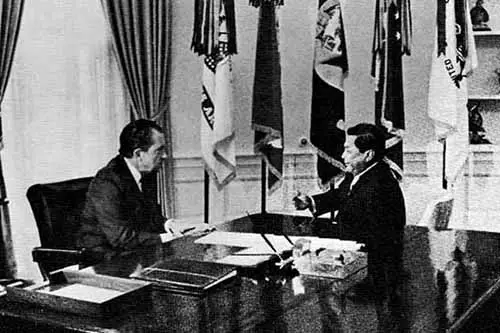
1970
Governor Carlos G. Camacho served as not only Guam’s last appointed governor, but also its first elected governor after the Guam Elected Governor Act was passed in 1968. Camacho’s election in 1970 was the first time the people of Guam selected their own leader since the Spanish colonized the island beginning in 1668. Image information: President Nixon and Governor Camacho, 1970 Guam USA Magazine.
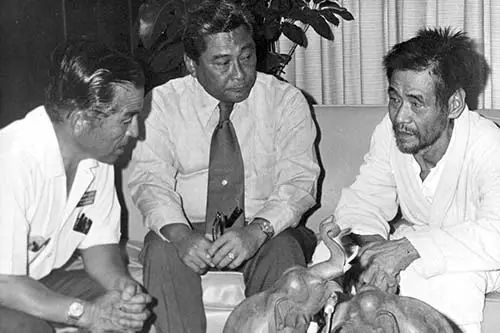
1972
Japanese Sgt. Shoichi Yokoi is captured by Manuel De Gracia and Jesus Duenas of Talo’fo’fo’. He was the last Japanese straggler on Guam, having hid in the jungle for 27 years. The two Talo'fo'fo' men found and captured him while they were hunting at night. He lived in an underground cave. Image information: Japanese Consul James Shintaku, Governor Carlos Camacho, and Sgt. Shoichi Yokoi courtesy of the Micronesian Area Research Center (MARC).
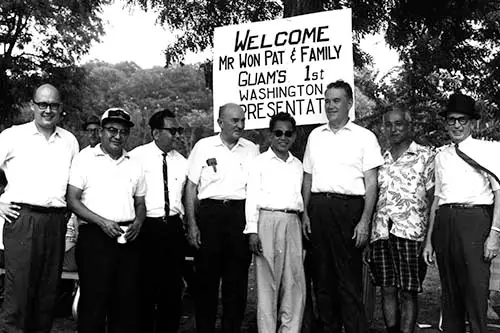
1972
US Congress passes a law establishing a Delegate of Guam. An elected official from Guam can speak on the House floor and introduce legislation though not vote. Antonio B. Won Pat became the first from Guam to take the oath of office as a member of the 93rd Congress in 1973. Image information: Won Pat As First Delegate to Congress courtesy of the Micronesian Area Research Center (MARC).
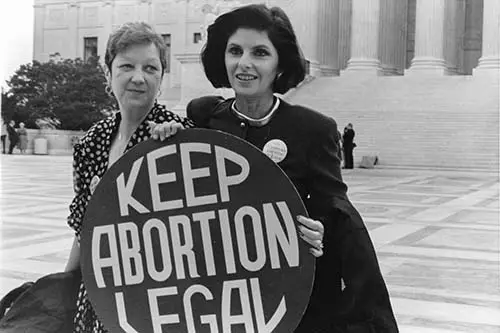
1973
A landmark legal decision is issued whereby the US Supreme Court struck down a Texas statute banning abortion, effectively legalizing the procedure across the US. The Court ruling said that a woman’s right to an abortion is implicit in the right to privacy protected by the 14th Amendment to the Constitution. Image information: Norma McCorvey (Jane Roe) and her lawyer Gloria Allred on the steps of the Supreme Court, 1989.
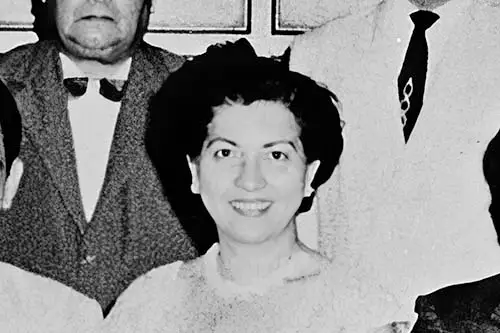
1974
Lagrimas Leon Guerrero Untalan translates the "Guam Hymn" into Chamorro. Untalan was an educator, political pioneer and cultural advocate. “Fanhoge CHamoru” becomes the anthem for Guam. The original song was written by Ramon Sablan in 1919. Image information: Lagrimas LG Untalan in 3rd Guam Legislature, Guam Legislature Collection.
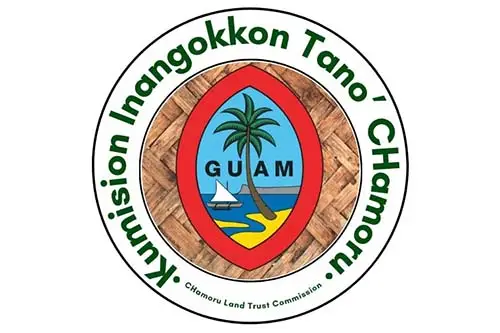
1975
The CHamoru Land Trust Act, written by Sen. Paul Bordallo, passes with the intention of providing land to landless CHamorus/Chamorros, many of who had lost their land during the US Navy’s land takings just after World War II. Much of the land was used for military bases. Image information: CHamoru Land Trust Commission Logo.
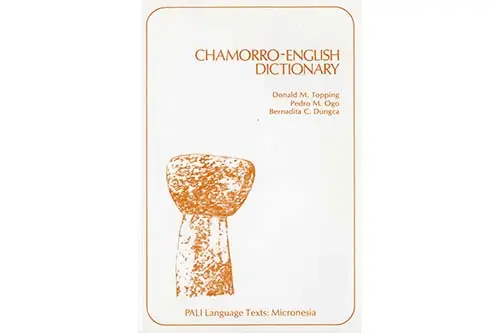
1975
A comprehensive CHamoru/Chamorro-English Dictionary is published as a collaboration between linguistics professor Donald Topping of University of Hawai’i, Pedro M. Ogo of Rota, and Bernadita C. Dungca of the University of Guam. Image information: Guampedia scan.
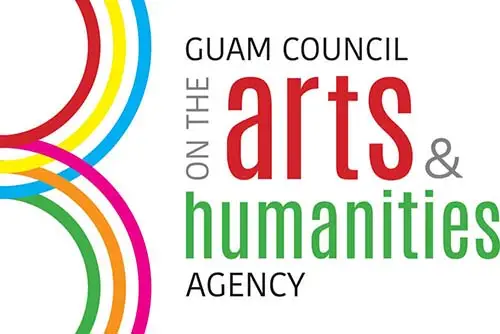
1975
Governor Ricardo J. Bordallo establishes the Insular Arts Council, now the Guam Council on the Arts and Humanities Agency, as part of the executive office in 1975. The agency was dedicated to the development of programs in music, visual arts, cultural heritage, literature and arts education. Image information: CAHA Logo.
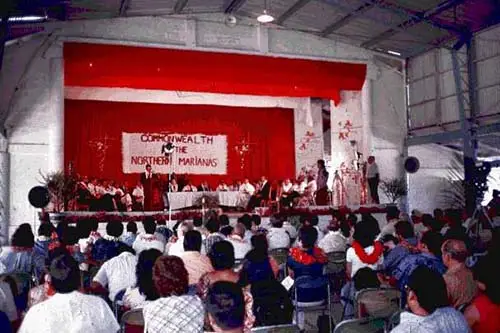
1975
The people of the Northern Mariana Islands decide not to seek independence, but instead to forge a closer relationship with the US. Negotiations for commonwealth status began in 1972 and a covenant to establish a commonwealth in political union with the US was approved in a 1975 referendum. Image information: Audience at Covenant Signing.
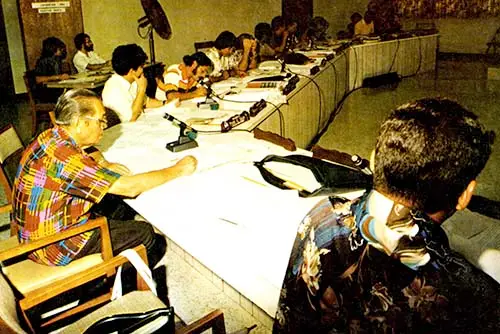
1976
Legislation authorizes a second Constitutional Convention to be held to make recommended modifications to the Organic Act of Guam. The proposed constitution incorporated social, economic, cultural, political and administrative reforms. It is rejected by the people who decided they must sort out their political relationship with the US first. Image information: Constitutional Convention courtesy of the Micronesian Area Research Center (MARC).
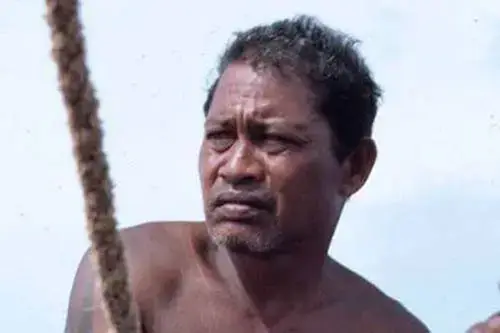
1976
Pius Mau Piailug, master navigator from Satawal, Yap State, was a teacher of traditional wayfinding methods for open-ocean voyaging. Mau shared his knowledge with the Polynesian Voyaging Society. With Mau’s help, the group was able to sail the Hōkūle’a, a modern double-hulled Hawaiian voyaging canoe, from Hawai`i to Tahiti. Image information: Mau Piailug Holding Canoe Ropes.
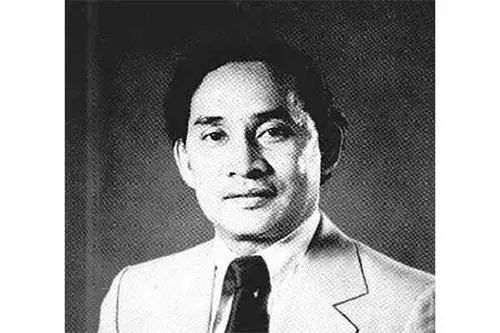
1977
A new government and constitution go into effect in the Commonwealth of the Northern Mariana Islands. Carlos S. Camacho becomes the first elected governor. Image information: Governor Carlos Camacho, NMI.
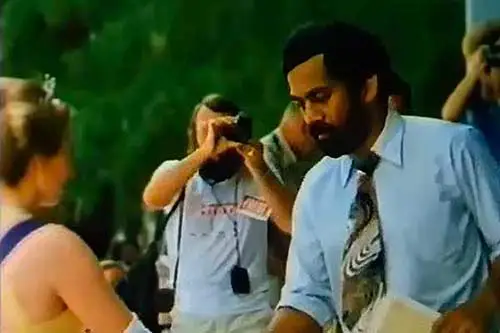
1979
Kiribati attains independence from the United Kingdom. Ieremia Tabai is the first President. The sovereign state comprises 32 atolls and reef islands and one raised coral island, Banaba. Kiribati is a total land area of 310 square miles and is dispersed over 1.3 million square miles. Tarawa is the capital. Image information: Nation of Kiribati Independence Celebration.
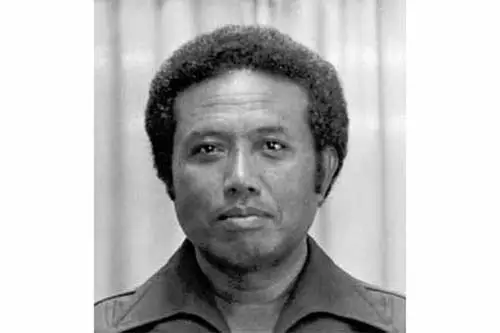
1981
Palau opts for independence in 1978. It approved a new constitution and became the Republic of Palau in 1981. Haruo Remeliik is elected its first president. Image information: Haruo Remeliik, 1976.
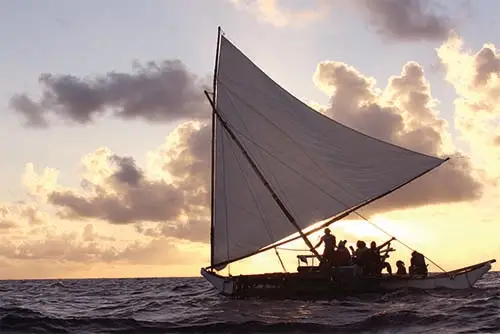
1982
Segundo Blas trains Rob Limtiaco and Gary Guerrero how to build a traditional Chamorro canoe, an art that was nearly lost. Together the men built a 15-foot outrigger canoe with funding from the National Endowment for the Arts (NEA) and the Guam Council on the Arts and Humanities Agency (CAHA). Image information: Saina’s Maiden Voyage, by Ron J. Castro.
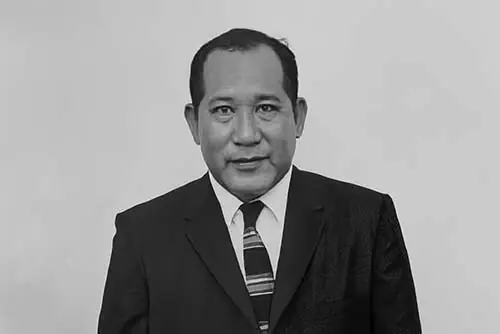
1983
Republic of the Marshall Islands is established and Amata Kabua is elected its first president. Independence is achieved in 1986 and a Compact of Free Association goes into effect with the US. Image information: Amata Kabua.
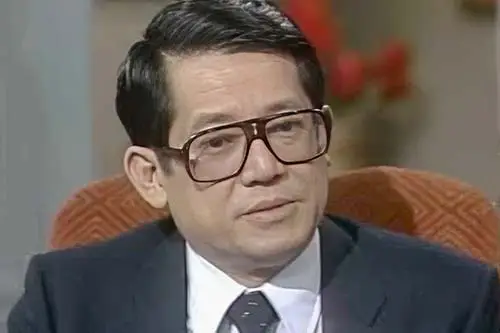
1983
Benigno S. Aquino, Jr., a political rival of Philippines president Marcos, is slain in Manila. Aquino was a leader of the opposition towards President Ferdinand Marcos. He had been permitted to leave the country for medical treatment in the US but was then assassinated at the airport upon his return. Image information: Benigno Aquino Jr.
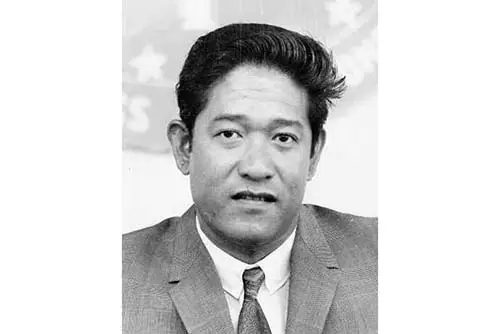
1983
Federated States of Micronesia is established. It includes Chuuk, Pohnpei, Yap, and Kosrae. Tosiwo Nakayama of Onoun, Chuuk, is elected its first president. Independence is achieved in 1986 and a Compact of Free Association goes into effect with the US. Image information: Senator Tosiwo Nakayama, Truk.
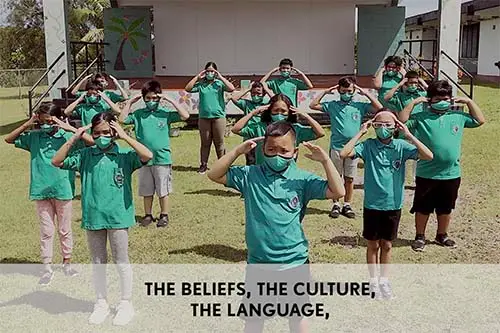
1984
The Government of Guam adopts the Inifresi as a pledge for Guam’s schoolchildren to learn. It is usually recited during festivities after “Fanohge CHamoru” (“Guam Hymn”) and the Pledge of Allegiance. Inifresi was written by Bernadita Camacho Dungca, PhD. Image information: Inifresi, performed by Wettengel Elementary School's 4th Grade Reading Class, 2021.
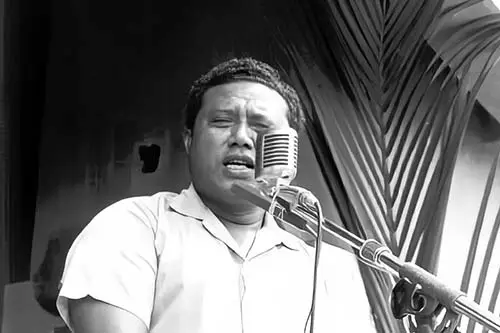
1985
Palau President Haruo Remeliik is assassinated as negotiations for a nuclear free Palau are underway. He served as the first president of Palau from 1981 until his assassination in 1985. The murder was never solved. Image information: Palau President Haruo Remeliik Giving a Speech.
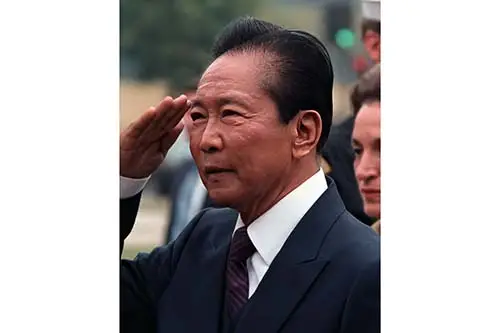
1986
Ferdinand Marcos is exiled from the Philippines after ruling for 20 years. He was the 10th president of the Philippines from 1965 to 1986. He ruled as a dictator under martial law from 1972 to 1981. His political opponent’s wife, Corazon Aquino, becomes president. Image information: Ferdinand Marcos, 1982.
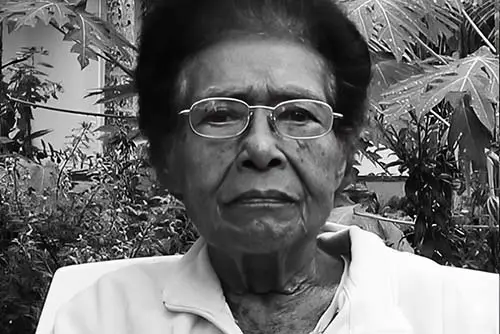
1988
Palauan Gabriela Ngirmang is nominated for a Nobel Peace Prize for her role in keeping Palau nuclear-free as the leader of a women’s organization “Otil a Beluad” (“Anchor of our Land”). She addressed the United Nations and US Congress in her efforts. Image information: Gabriela Ngirmang (Palau).
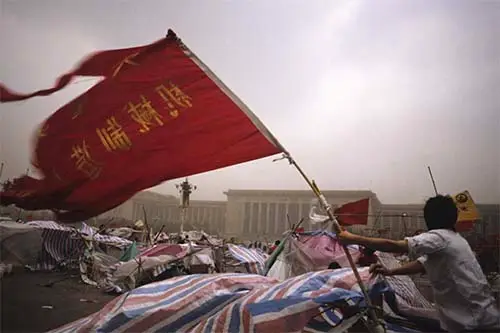
1989
More than one million in Beijing demonstrate for democracy as chaos spreads across China. Thousands are killed in Tiananmen Square as Chinese leaders take hard line toward demonstrators. Image information: Flag on Tiananmen Square.
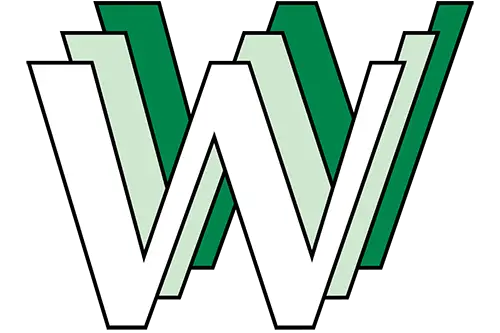
1991
The World Wide Web debuts, popularizing the internet. English scientist Tim Berners-Lee invented the Web in 1989, writing the first web browser in 1990 while employed at CERN in Switzerland. The browser was released publicly in 1991. The Web has been central to the development of the Information Age. Image information: WWW's "Historical" Logo.
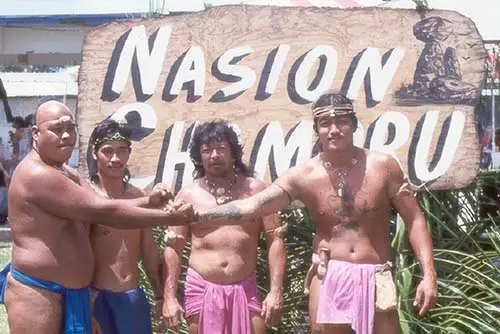
1991
Nasion Chamoru is formed, led by Angel LG Santos, with the intent of creating an independence movement for the CHamoru/Chamorro people. Santos read a declaration asserting the right of the Chamorros to exist as a nation and called on the Chamorros present to sign this declaration. Image information: Nasion Chamoru courtesy of Dr. Judy Flores.
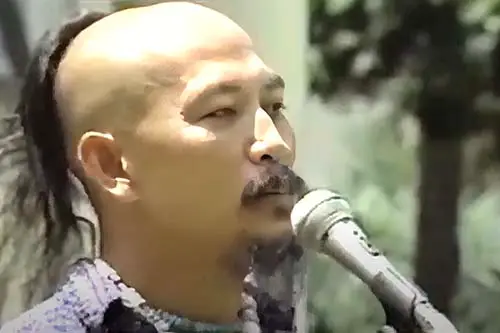
1992
Angel LG Santos, along with other members of Nasion CHamoru, asked the Superior Court of Guam to order Governor Joseph F. Ada to implement the CHamoru/Chamorro Land Trust Act and prevails. Later, as a senator, Santos authorized the Rules and Regulations for the Chamorro Land Trust Commission. Image information: Old Videos of Late Angel Santos Resurface, Shed Light on Current Events.

1993
An act to provide landless CHamorus/Chamorros with $1 a year leases for land to live and farm on finally had its first meeting 18 years after it was signed into law. The newly formed CHamoru Land Trust Commission began the difficult task of surveying land and making it available to eligible applicants. Image information: CHamoru Land Trust Commission Logo.
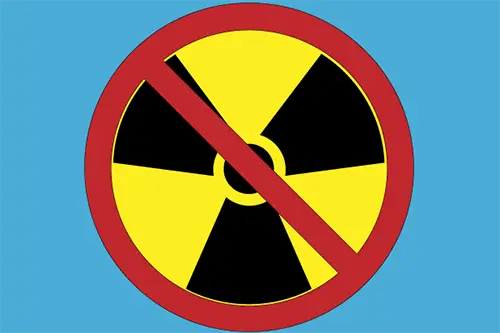
1994
The Republic of Palau gains its independence and after much political upheaval and hard work, signs a nuclear-free 50 year compact with the US. Image information: Guampedia Graphic.
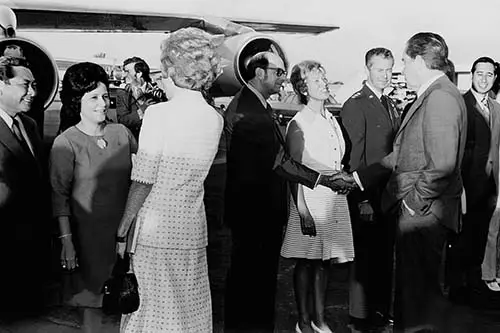
1994
The United Nation’s Trust Territory of the Pacific Islands (TTPI), formed just after World War II, ends in 1994. All the islands under its jurisdiction had transitioned into various political entities. It was first administered from Guam and then Saipan. Image information: HiCom Johnston Shaking Hands with Pres. Nixon on Guam.
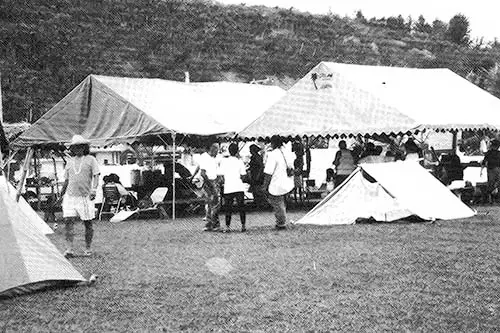
1995
Angel LG Santos begins a hunger strike to protest the distribution of land in the Land for the Landless program as it is open to non-CHamorus/Chamorros. Santos wants it placed under the CHamoru Land Trust. Two months later lawmakers approved a bill to transfer all land from the Land for the Landless program to the Trust. Image information: Nasion Chamoru Protest at Adelup courtesy of the Department of Chamorro Affairs.
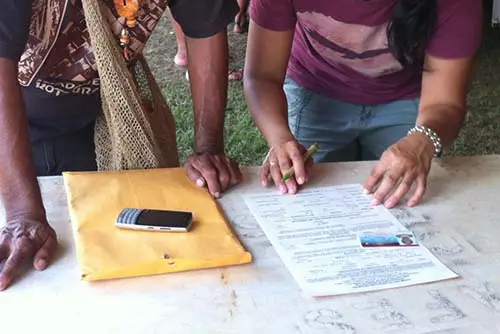
1996
The CHamoru/Chamorro Registry is created to register the people of Guam who were made US citizens by the Organic Act in 1950 and their descendants. The registry is also used “for historical, ethnological and genealogical proposes, as well as for the future exercise of self-determination by the indigenous Chamorro people of Guam.” Image information: Registration at Micronesian Island Fair courtesy of the Office of Senator Vicente (ben) C. Pangelinan.

1998
Google, a web search engine, is launched. Two Stanford University students built a search engine that used links to determine the importance of pages on the Web. The idea was to organize the world’s information and make it accessible and useful. They found some investors and it was launched. Image information: 1998 Google Logo.

2001
Hijackers ram jetliners into the twin towers of New York City’s World Trade Center and the Pentagon, terrorizing the US. A fourth hijacked plane crashes 80 miles outside of Pittsburgh. More than 3,000 people died. Islamic militant Osama bin Laden and the al-Qaeda terrorist network are identified as behind the attacks. Image information: NYC WTC Site 2001-09-13.
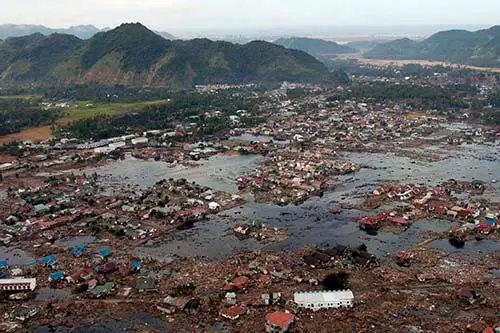
2004
A series of tsunamis up to 100 ft high, created by an earthquake, flooded communities along the coasts of the Indian Ocean and killed an estimated 227,898 people in 14 countries. It was one of the deadliest natural disasters in recorded history and the deadliest of the 21st century. Indonesia was the hardest-hit country. Image information: Us Navy 050102-N-9593M-040 a Village near the Coast of Sumatra Lays in Ruin After the Tsunami That Struck South East Asia.

2004
The social networking service Facebook is launched in 2004. It was created by two Harvard University students to communicate with their friends. Later it was expanded to other colleges and then corporations, and by September 2006, to everyone with a valid email address along with an age requirement of being 13 and older. Image information: Facebook Logo 2004.

2007
The development of the iPhone began with a request from Apple Inc. CEO Steve Jobs to the company’s engineers, asking them to investigate the use of touchscreen devices with excellent synchronization software. Jobs also had Apple develop the iTunes software. The iconic cell phone went on the market in 2007. Image information: Steven P. Jobs Presents the iPhone.
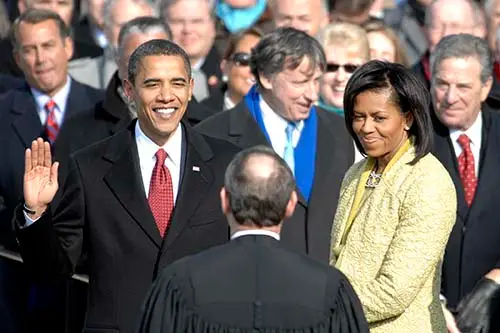
2008
Barack Obama, born and raised in Hawai'i, is elected president of the United States, the first black man to lead the US. Obama, a Democrat, served two terms as the 44th President from 2009 to 2017. He previously served as a senator. Image information: US President Barack Obama Taking His Oath of Office.
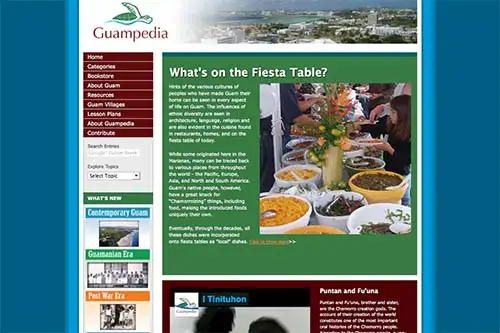
2008
After six years of development, Guampedia goes online. It is a community project that highlights the unique CHamoru/Chamorro heritage and history of Guam and the Mariana Islands. Through peer-reviewed entries and accompanying media, Guampedia provides an important educational and informational resource to those wanting a better understanding of the region. Image information: Guampedia screen grab.
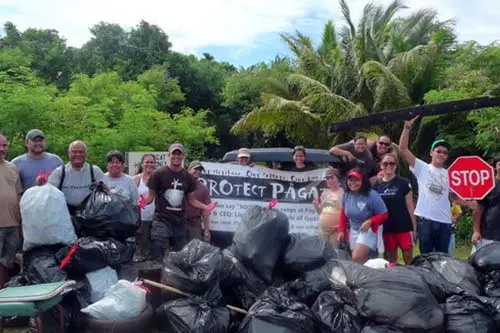
2010
Guam Preservation Trust and We Are Guahan join in a lawsuit with the National Trust for Historic Preservation against the Department of Defense over a decision to use an area of land adjacent to the historic and culturally-rich village of Pågat for a firing range complex for US Marines. Image information: Pågat Cleanup courtesy of We Are Guahan.
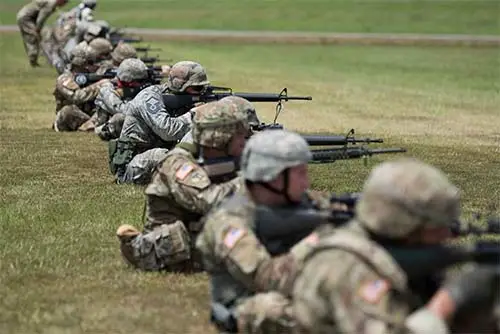
2011
A federal judge dismisses a lawsuit regarding building a military firing range at Pågat, Guam but only after the Department of Defense agrees to conduct more environmental research, in essence, beginning the site selection process all over again. Ritidian, on the northeast coast of Guam, is then chosen as the preferred firing range site. Image information: WPW Championship.
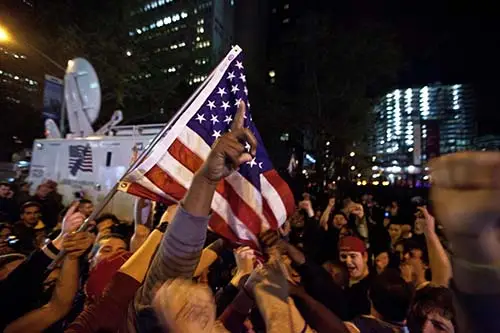
2011
A US special forces team, under the direction of US President Barack Obama, kills Osama Bin Laden in Pakistan, 10 years after he led a terrorist attack on the US. Image information: Crowd Cheers Because of the Death of Osama Bin Laden.
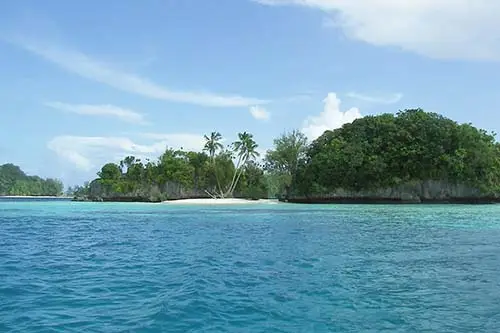
2012
The Rock Island’s Southern Lagoon in Palau is added to the list of UNESCO world heritage sites. The vast marine site is recognized for its exceptional ecological diversity, coral reefs, lagoon, limestone islands and marine lakes. Since the islands are isolated from each other, 52 marine lakes are different marine ecosystems. Image information: Rock-Islands, Republic of Palau.
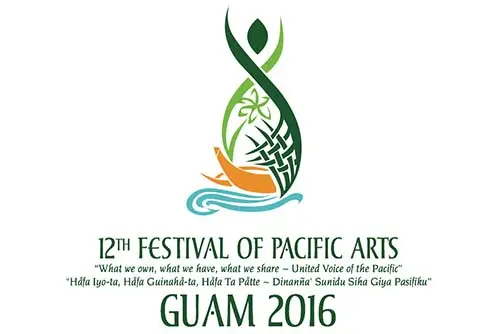
2016
Guam is the site of FestPac. Every four years since 1972, the islands of the Pacific gather to share in a special celebration of the arts. Thousands participate in the festival for two weeks which showcases traditional arts other forms of artistic traditions unique to this part of the world. Image information: FestPac Logo.
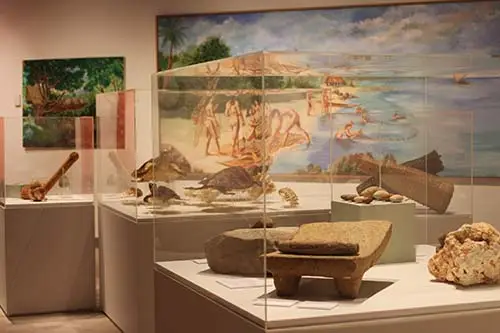
2016
The Guam Museum, a government owned institution with a focus on the history of Guam, opens in Hagåtña. It is hoped to encourage people to engage in dialogue, to share multiple perspectives and experiences, and debate issues that concern residents today. The building was designed by CHamoru/Chamorro architect Andrew Laguaña. Image information: Opening Exhibition courtesy of the Guam Museum.
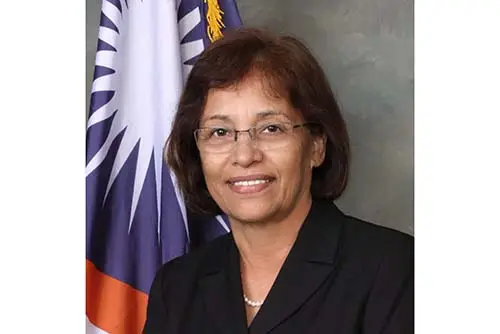
2016
Republic of the Marshall Islands elects Hilda C. Heine, first woman president in the Micronesian region. She is also the first person in the Marshalls to earn a doctorate. She founded Women United Together Marshall Islands (WUTMI). Heine served as the Minister of Education prior to assuming office. Image information: Her Excellency Hilda C. Heine.
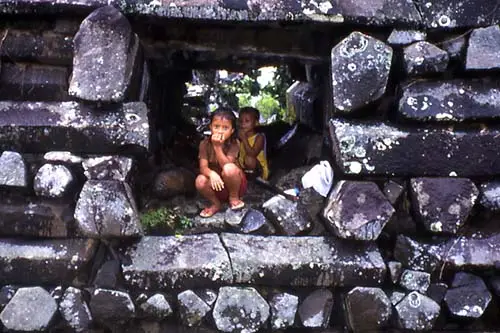
2016
Nan Madol, 99 ancient islets in Pohnpei, is added to UNESCO world heritage sites. The islets contain architectural remains dating from the 13th century. Nan Madol is located off the south-east coast of Pohnpei. It contains the remains of stone palaces, temples and tombs built between the 13th and 16th centuries. Image information: Kids in Passage Through Basalt Wall, Nan Madol, Pohnpei.
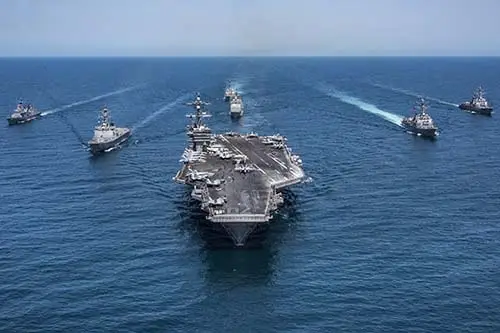
2017
North Korea renews its threat to attack Guam with missiles, warning that US President Donald Trump’s social media antics and military moves are pushing Pyongyang over the edge. The US responds by increasing the number of bombs stored on island. Tourism from Japan drops but increases from South Korea. Image information: WESTERN PACIFIC.
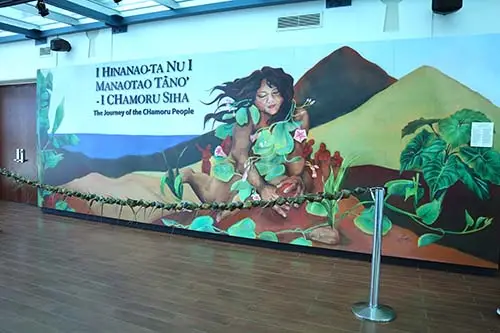
2018
The Guam Museum’s permanent exhibit “I Hinanao-Ta Nu Manaotao Tåno’-I CHamoru Siha: The Journey of the CHamoru People” opens. It tells the 3,500 year story of the CHamoru/Chamorro people and of Guam. The exhibit has seven galleries that takes the visitor through a timeline of history. Image information: Permanent Exhibit Entrance Mural of Fo’na (Fu’una) courtesy of the Guam Museum.
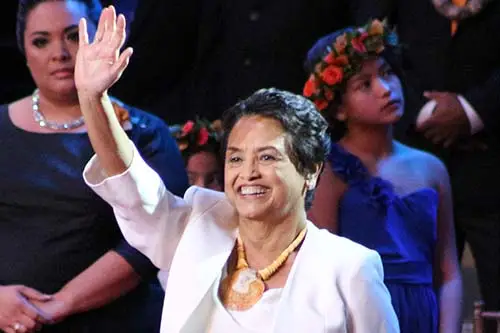
2019
Lourdes Aflague Leon Guerrero is elected as the first woman governor of Guam. With her inauguration in January 2019 as the Maga’håga of Guam, all branches of the Government of Guam are led by women. Tina Muna Barnes is selected as the Speaker of the Guam Legislature, with 10 of the 15 senators being women as well. Katherine Maraman serves as Guam’s Chief Justice of the Guam Supreme Court. Image information: Guampedia photo.
